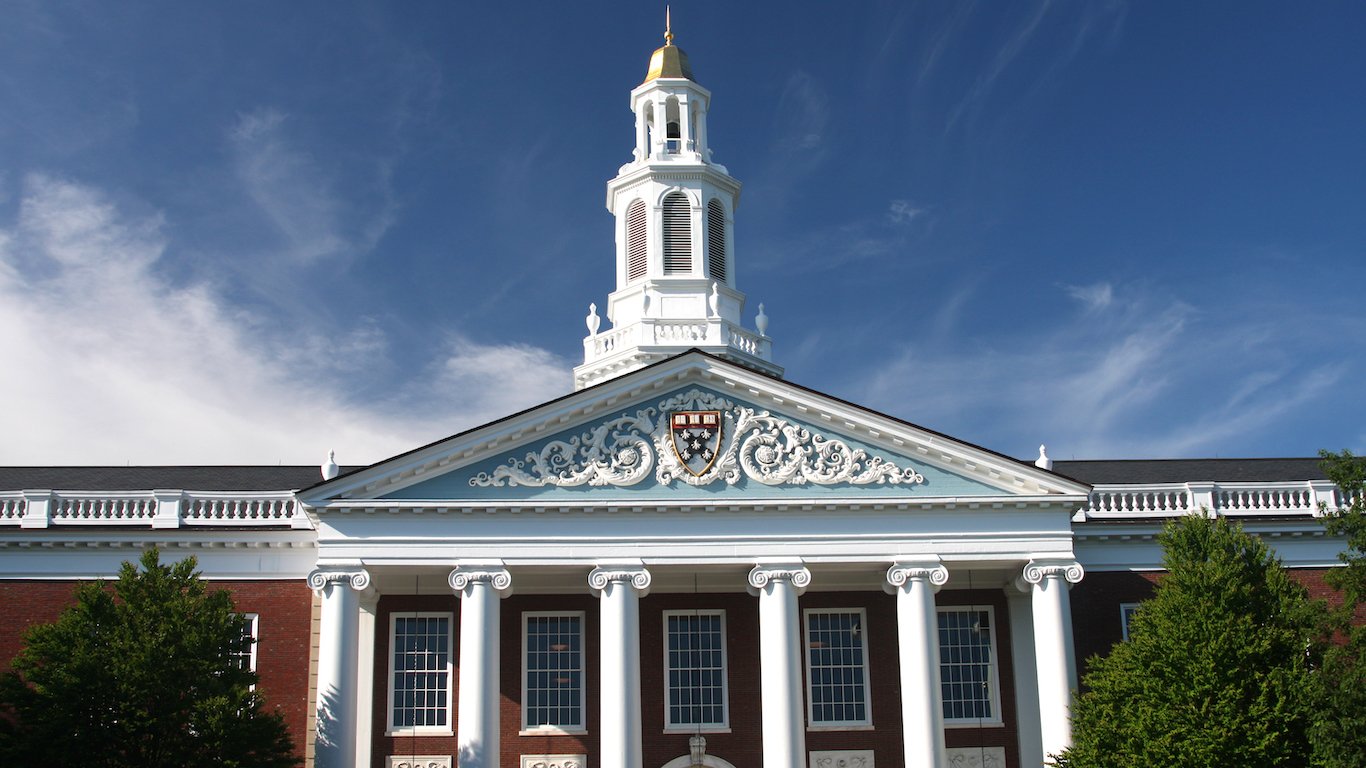

Having a college education may be more important than ever before. On average, workers with a college education earn more than those with less education and are less likely to lose their jobs or face long periods of unemployment.
Applying for college is a major undertaking, with no guarantee of acceptance. Acceptance rates are often considered an approximation for exclusivity, and in general, it can be expected that a school with a lower acceptance rate will grant a better education and a more prestigious degree.
While acceptance rates and SAT scores offer a good indication of a university’s prestige, they are not the only factors to take into consideration. The desired career might point a student to a state university that offers a specialty program, even if the university has an acceptance rate that is higher than an elite private university. As with many important life choices, the more research the better.
Click here to see the hardest colleges to get into by state.
Click here to see our methodology.
24/7 Wall St. reviewed education data across thousands of four-year, degree-granting institutions from the National Center for Education Statistics and other sources to determine each state’s most selective college. We indexed acceptance rates, as well as SAT and ACT scores of admitted students, to measure the difficulty of being accepted to those universities and colleges.
Some states have large elite universities that receive tens of thousands of applications and accept only a fraction of them. Other schools on this list are small, expensive private institutions.

Alabama
> Most selective college: The University of Alabama
> Admission rate: 53.3%
> SAT at 25th and 75th percentiles: 1050 and 1280
> Annual net price of attendance: $19,993
Known for its successful athletics programs, the Tuscaloosa-based institution is the flagship of the statewide University of Alabama System. UA is the state’s oldest institution of higher education — it was founded in 1831. In 2018, total enrollment at the university reached a record 38,392 students. Notable graduates include U.S. Supreme Court Associate Justice Hugo Black, novelist Harper Lee, and Tony Award-winning actor Norbert Leo Butz.
[in-text-ad]

Alaska
> Most selective college: University of Alaska Fairbanks
> Admission rate: 76.7%
> SAT at 25th and 75th percentiles: 1030 and 1270
> Annual net price of attendance: $9,010
The University of Alaska, including its flagship Fairbanks campus, consists of six campuses statewide, one community college, and an online education portal. As of the fall 2017 semester, there were only 9,783 enrolled undergraduate students at University of Alaska Fairbanks, including 1,063 graduate students. The university’s research focal points include agriculture and forestry, arctic research, and marine science. The university recently began offering a class on the chemistry of cannabis, which tackles the social impacts and economic opportunities of legalized marijuana. Alaska has one of the nation’s most liberal marijuana laws.

Arizona
> Most selective college: Embry-Riddle Aeronautical University-Prescott
> Admission rate: 76.5%
> SAT at 25th and 75th percentiles: 1130 and 1350
> Annual net price of attendance: $34,120
As the name implies, Embry-Riddle is an aeronautical-focused institution. Founded in 1926, this private institution is far more than a flight school. It offers courses on the business and science of aviation and aerospace with majors including engineering, physical sciences, computers and technology (including cyber security), and transportation. Embry-Riddle’s Robertson Safety Institute hosts an aircraft crash investigation laboratory that provides students with hands-on field investigations of aircraft accident scenarios.
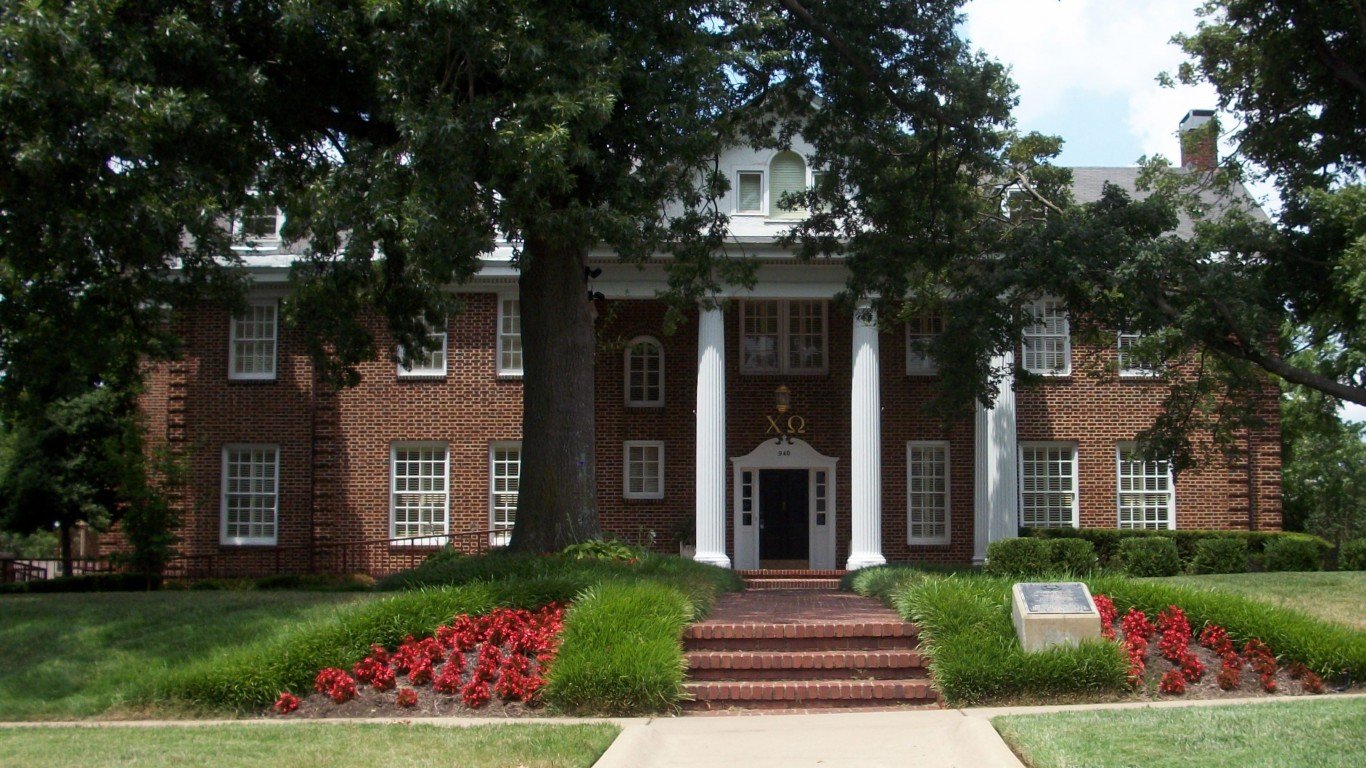
Arkansas
> Most selective college: University of Arkansas
> Admission rate: 66.0%
> SAT at 25th and 75th percentiles: 1110 and 1280
> Annual net price of attendance: $15,966
Founded in 1871, the University of Arkansas’ Fayetteville campus is the flagship of the University of Arkansas System. Enrollment in the fall of 2018 was 27,778, and the student high school GPA average was 3.69. The university boasts strong programs in animal sciences, business, law, and Middle Eastern studies. Famous UA alumni include the late U.S. Sen. James William Fulbright, co-inventor of fiber optic cable Robert Maurer, and journalist/TV personality T.J. Holmes.
[in-text-ad-2]
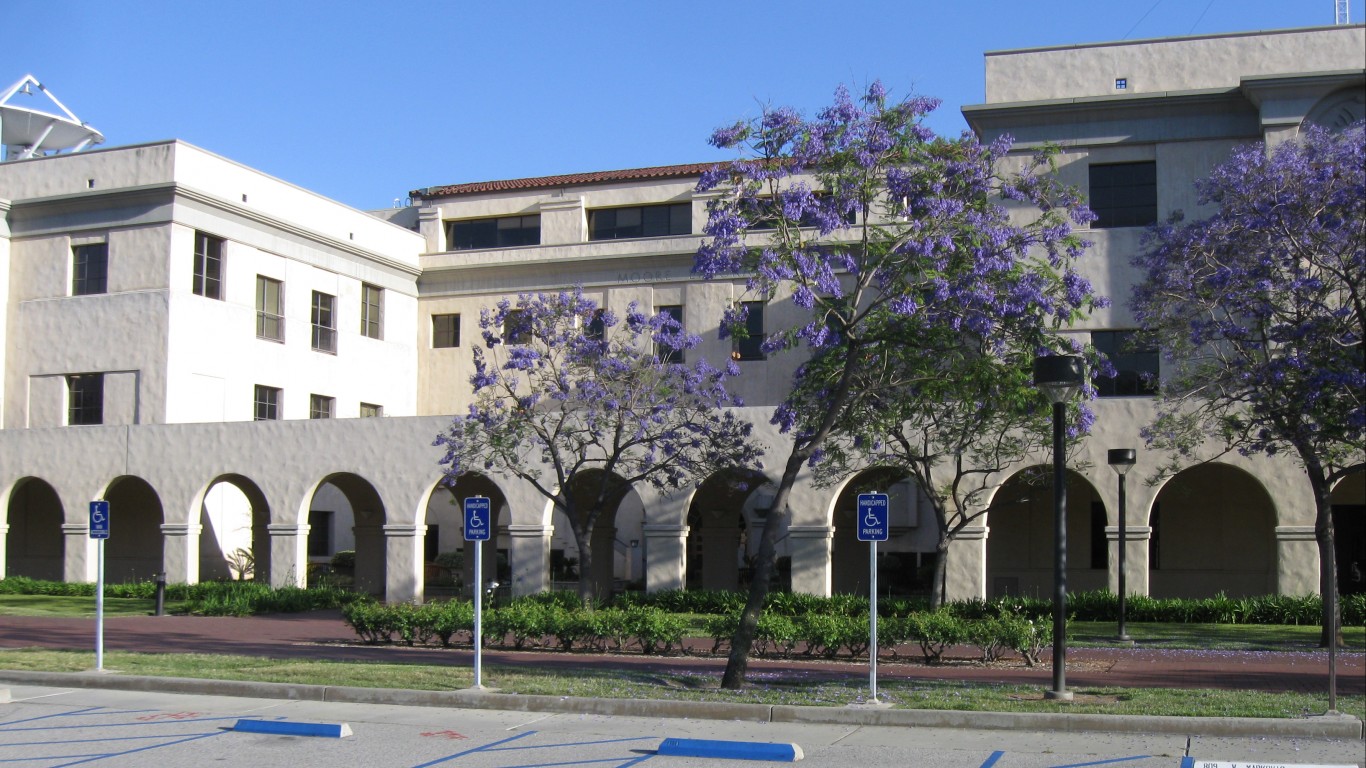
California
> Most selective college: California Institute of Technology
> Admission rate: 7.7%
> SAT at 25th and 75th percentiles: 1530 and 1590
> Annual net price of attendance: $24,466
Caltech is a private doctorate-granting research university in Pasadena, California, known for its natural science and engineering programs. It is consistently ranked among the world’s top institutions like MIT, Harvard, and the universities of Oxford and Cambridge. Caltech boasts six academic divisions, including geological and planetary sciences and physics, mathematics, and astronomy. Notable alumni include Apollo astronauts Frank Borman and Harrison Schmitt, film director Frank Capra (“It’s a Wonderful Life”), and Moshe Arens, former Israeli defense and foreign affairs minister.

Colorado
> Most selective college: United States Air Force Academy
> Admission rate: 11.9%
> SAT at 25th and 75th percentiles: 1210 and 1390
> Annual net price of attendance: N/A
Located just outside of Colorado Springs, the USAFA was founded in 1954 and is the most recently founded of the five U.S. military service academies. Because it is focused on developing military personnel, USAFA accepts only recent high school graduates, with an age limit of 23. Graduates must commit to at least five years of active duty in the Air Force and three years as an inactive reserve officer. Students engage in 47 months of intense academic, physical, and character-building military training. Though learning to fly aircraft is a major part of the program, the academy offers 27 majors and four minors ranging from astronautical engineering to history.
[in-text-ad]
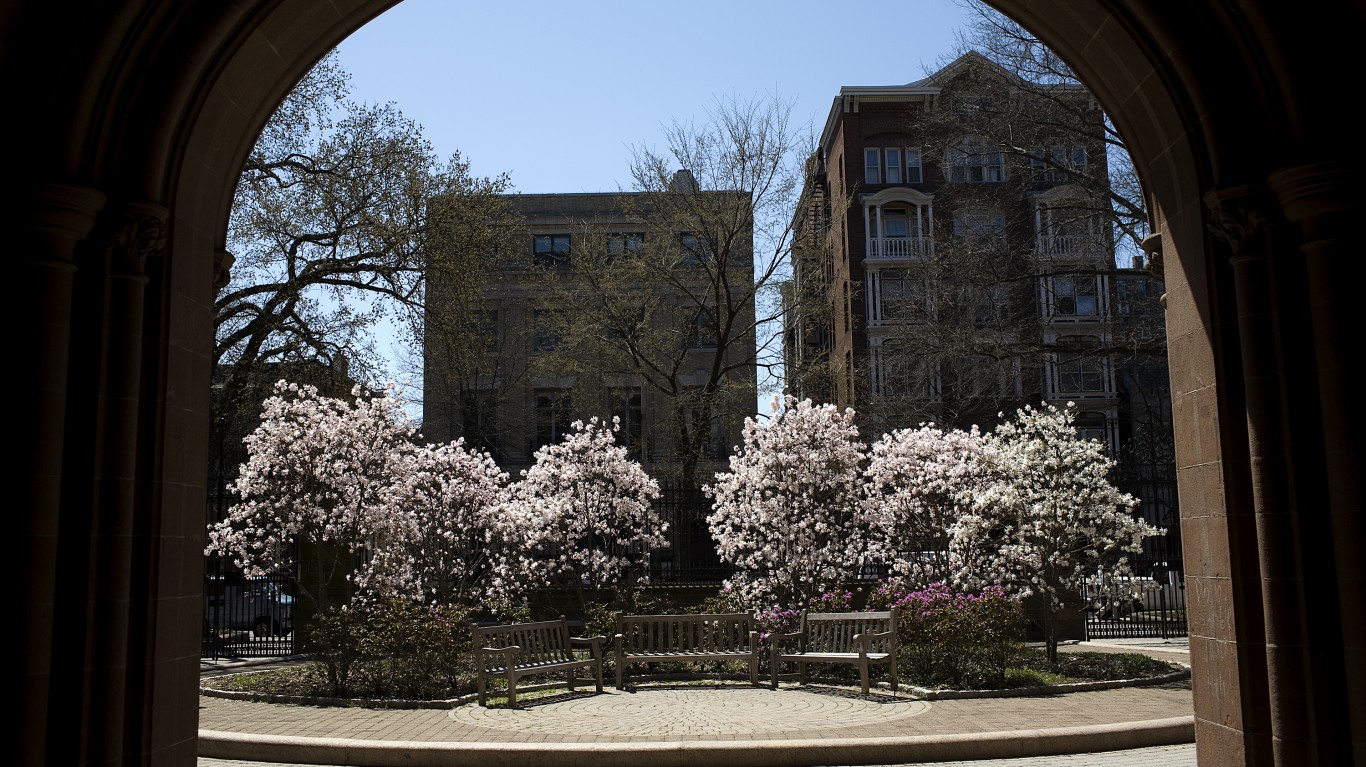
Connecticut
> Most selective college: Yale University
> Admission rate: 6.9%
> SAT at 25th and 75th percentiles: 1460 and 1580
> Annual net price of attendance: $18,053
Founded in 1701 as a theology school, New Haven-based Yale is the country’s fourth oldest university. As one of the world’s top research universities, it is extremely competitive, accepting less than one in 14 applicants on average. About 12,300 graduate and professional students from 118 countries attend the private Ivy League university, according to the latest available data. Getting into Yale is becoming more difficult. For the fourth consecutive year, Yale received a record number of undergraduate applications (36,829) for the next freshman class; less than 5% are expected to make the cut.
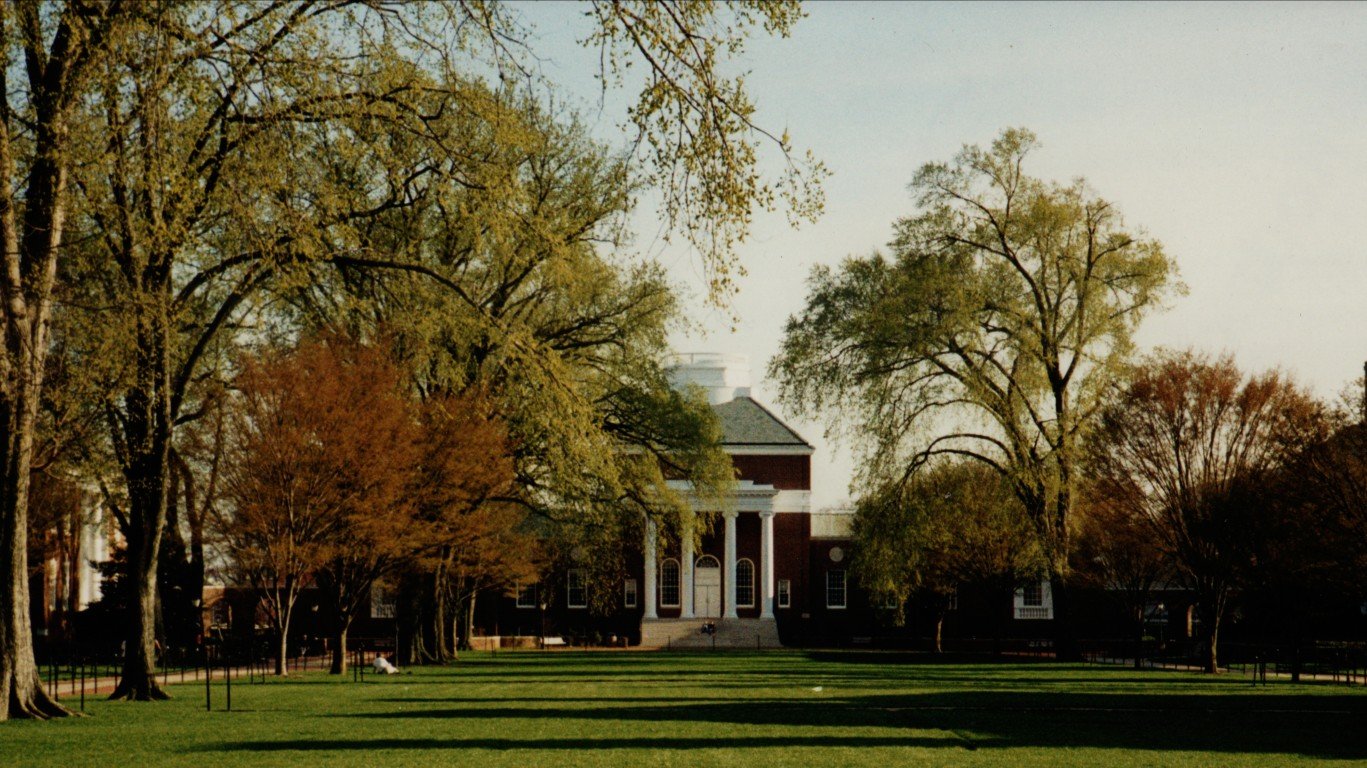
Delaware
> Most selective college: University of Delaware
> Admission rate: 62.9%
> SAT at 25th and 75th percentiles: 1130 and 1330
> Annual net price of attendance: $16,286
Based in Newark, the University of Delaware is a public research university with a total enrollment of about 24,100 undergraduate and graduate students across its seven colleges. Nearly one in three UD students spend time studying abroad at some point in their education, and in 2017, U.S. News and World Report said UD has the top ranking graduate program for physical therapy. Notable UD graduates include former New Jersey Gov. Chris Christie, inventor of Gore-Tex Robert Gore, and the late Nobel Prize winning microbiologist Daniel Nathans.
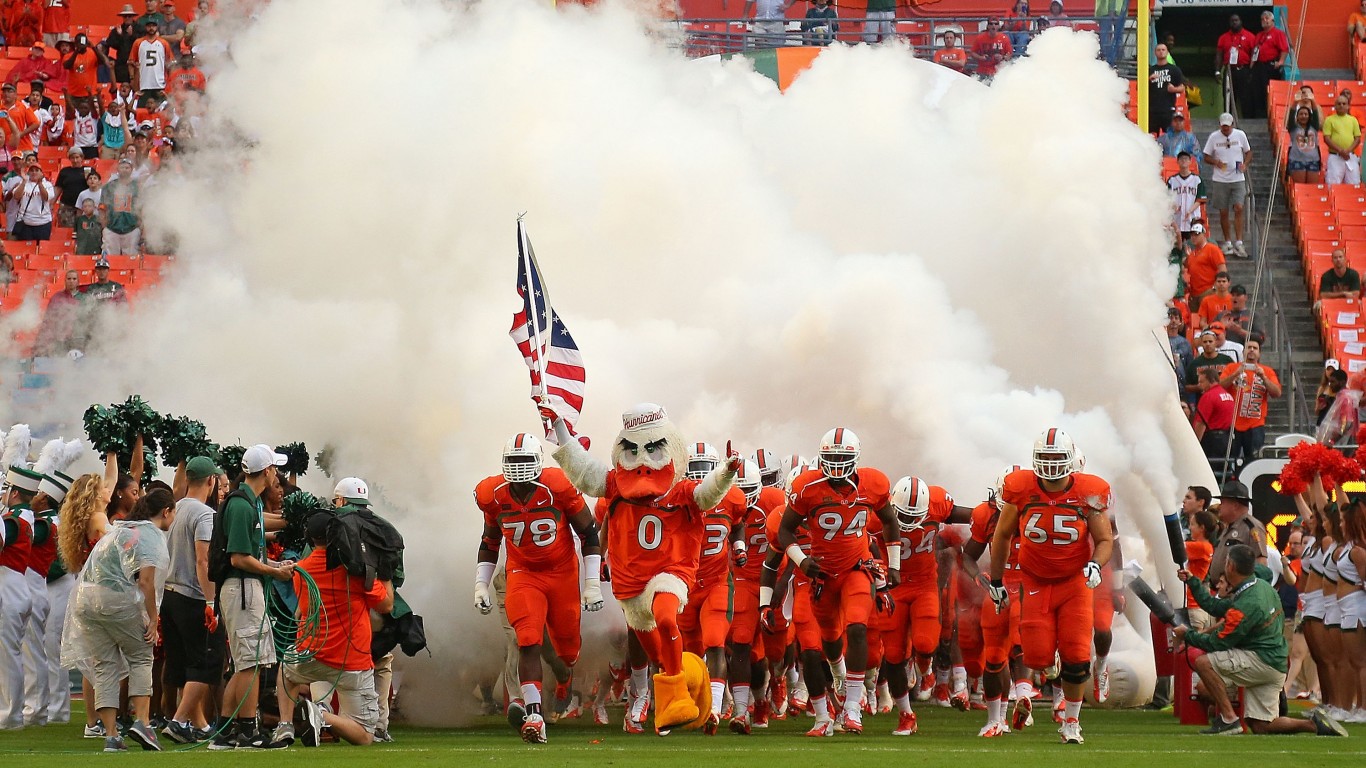
Florida
> Most selective college: University of Miami
> Admission rate: 35.7%
> SAT at 25th and 75th percentiles: 1230 and 1420
> Annual net price of attendance: $42,204
The University of Miami has long had a reputation as a party school, perhaps owing to its location, but it is also a reputable private research university. Established in 1925, the school attracts about 17,000 students to its 11 schools and colleges. It was ranked by U.S. News & World Report as the 46th best U.S. college for 2018, and 44th in the Wall Street Journal/Times Higher Education college ranking last year. Notable alumni include Sen. Marco Rubio, performer Gloria Estefan, and numerous professional athletes.
[in-text-ad-2]
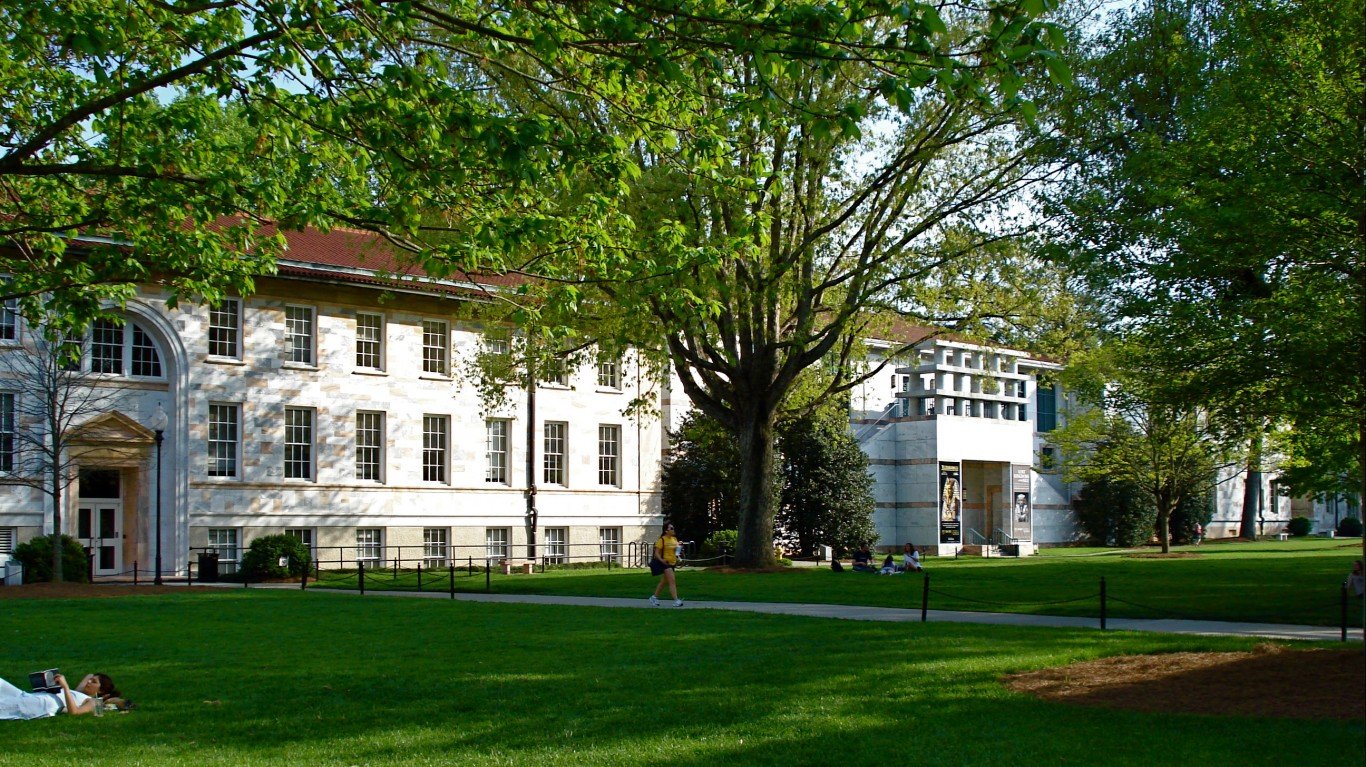
Georgia
> Most selective college: Emory University
> Admission rate: 22.0%
> SAT at 25th and 75th percentiles: 1350 and 1520
> Annual net price of attendance: $26,867
Atlanta-based Emory is a private institution with a strong liberal arts college and medical school. The institution, founded in 1836 by the Methodist Episcopal Church, has 11 colleges and schools focusing on business, nursing, public health, medicine, and law. There were 15,451 students enrolled in the fall 2018 semester. Notable alumni include six Pulitzer Prize winners: historians C. Vann Woodward, David M. Potter, Louis R. Harlan, and Dumas Malone, and journalists Claude Sitton and Frank Main.

Hawaii
> Most selective college: Brigham Young University-Hawaii
> Admission rate: 36.8%
> SAT at 25th and 75th percentiles: 1090 and 1253
> Annual net price of attendance: $12,155
BYU-Hawaii was founded in 1955 on Oahu island as part of a global expansion of the Church of Jesus Christ of Latter-day Saints. It focuses on mathematics, management, and liberal arts throughout its four colleges and aims to merge spiritual and secular learning, according to its site. BYU-Hawaii is operated by the LDS Church Educational System that has similar campuses in Idaho, Provo, Utah, and Salt Lake City, as well as elementary and secondary schools worldwide. Last year, a group of BYU-Hawaii students won a national competition for their sustainable farming project aimed to help rice farmers in Hawaii and the Philippines.
[in-text-ad]
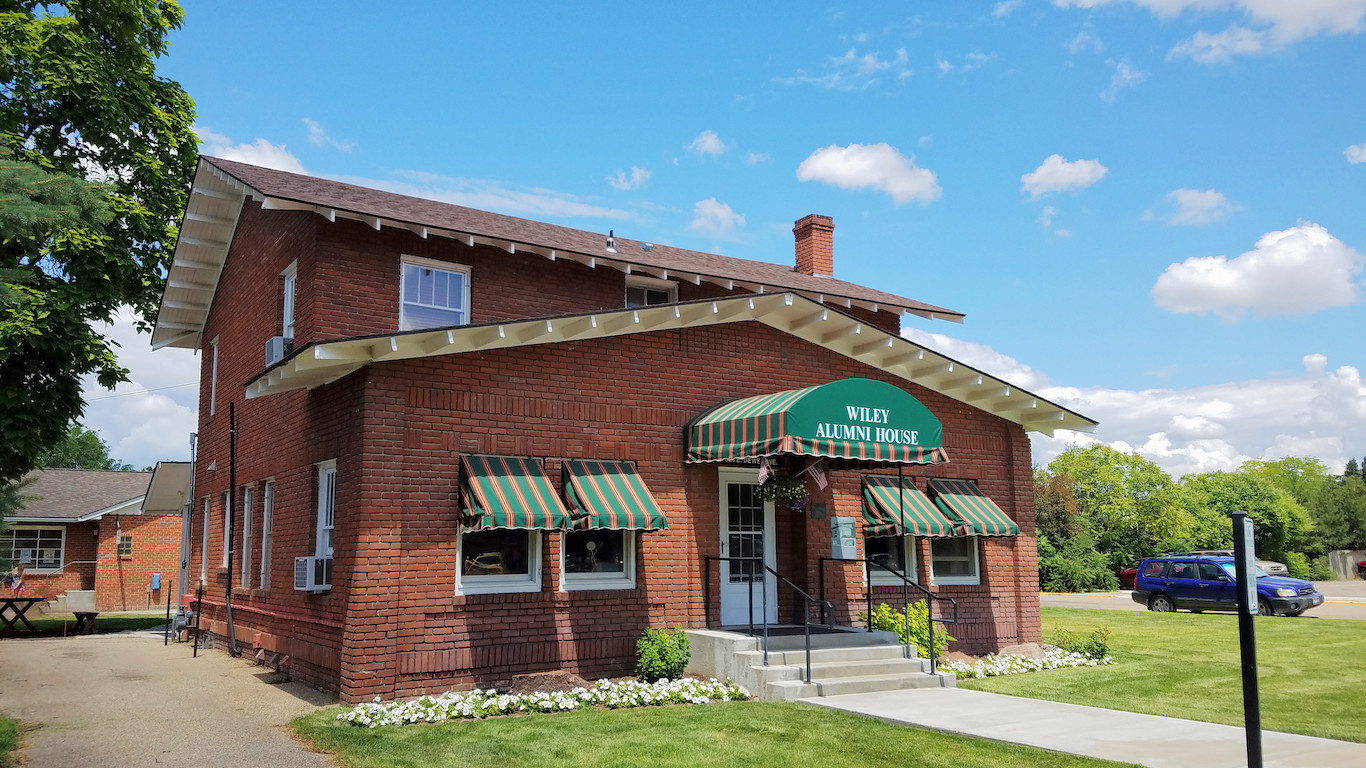
Idaho
> Most selective college: Northwest Nazarene University
> Admission rate: 73.4%
> SAT at 25th and 75th percentiles: 1030 and 1230
> Annual net price of attendance: $19,204
Nampa, Idaho-based Northwest Nazarene University was founded as an elementary and Bible school in 1913 and became a private liberal arts college later, reaching accreditation in 1937. The campus is small, with an enrollment of about 2,000 undergraduate and graduate students. Like some of the other private universities on this list, NNU focuses on both spiritual and secular education at its two colleges. It offers dozens of baccalaureate programs and nearly 20 master’s degrees. NNU offers a robust athletics program for a school of its size and is home to a high-ranking women’s basketball team.

Illinois
> Most selective college: University of Chicago
> Admission rate: 8.7%
> SAT at 25th and 75th percentiles: 1480 and 1580
> Annual net price of attendance: $34,834
Established in 1890, the University of Chicago is a private nonprofit research university located on the city’s south side. UChicago has six professional schools focusing on medicine, business, law, social services, public policy, and professional studies. The university teaches about 15,400 undergraduate and graduate students pursuing any one of dozens of majors. UChicago also manages the Argonne National Laboratory, the U.S. government’s science and engineering research center that evolved from the university’s work on the Manhattan Project in the 1940s.

Indiana
> Most selective college: University of Notre Dame
> Admission rate: 18.9%
> SAT at 25th and 75th percentiles: 1370 and 1520
> Annual net price of attendance: $27,453
This private non-profit Catholic research university was founded in 1842 by a group of priests led by Rev. Edward Sorin, who was granted land from the state’s Roman Catholic Diocese. These days, about 12,000 students enroll in the Notre Dame, Indiana-based university each year in its eight colleges and schools. The university has programs in humanities, social sciences, engineering, and business, as well as a popular college football team. Notable Notre Dame alumni include former Secretary of State Condoleezza Rice, former NFL quarterback Joe Montana, and astronauts Michael B. Good and Kevin A. Ford.
[in-text-ad-2]

Iowa
> Most selective college: Grinnell College
> Admission rate: 28.9%
> SAT at 25th and 75th percentiles: 1310 and 1510
> Annual net price of attendance: $29,492
Founded in 1848 by a group of Congregationalists who travelled west from New England, this private liberal arts college in the Iowa city that shares its name offers undergraduate degree programs in the humanities, science, and social studies. The campus is small, with enrollment of about 1,600 students. The college touts a so-called Individually Advised Curriculum that emphasizes faculty mentoring. Notable graduates include the late actor Gary Cooper, Pulitzer Prize-winning journalist Robert Hodierne, and the late inventor and co-founder of Intel Corp. Robert Noyce.
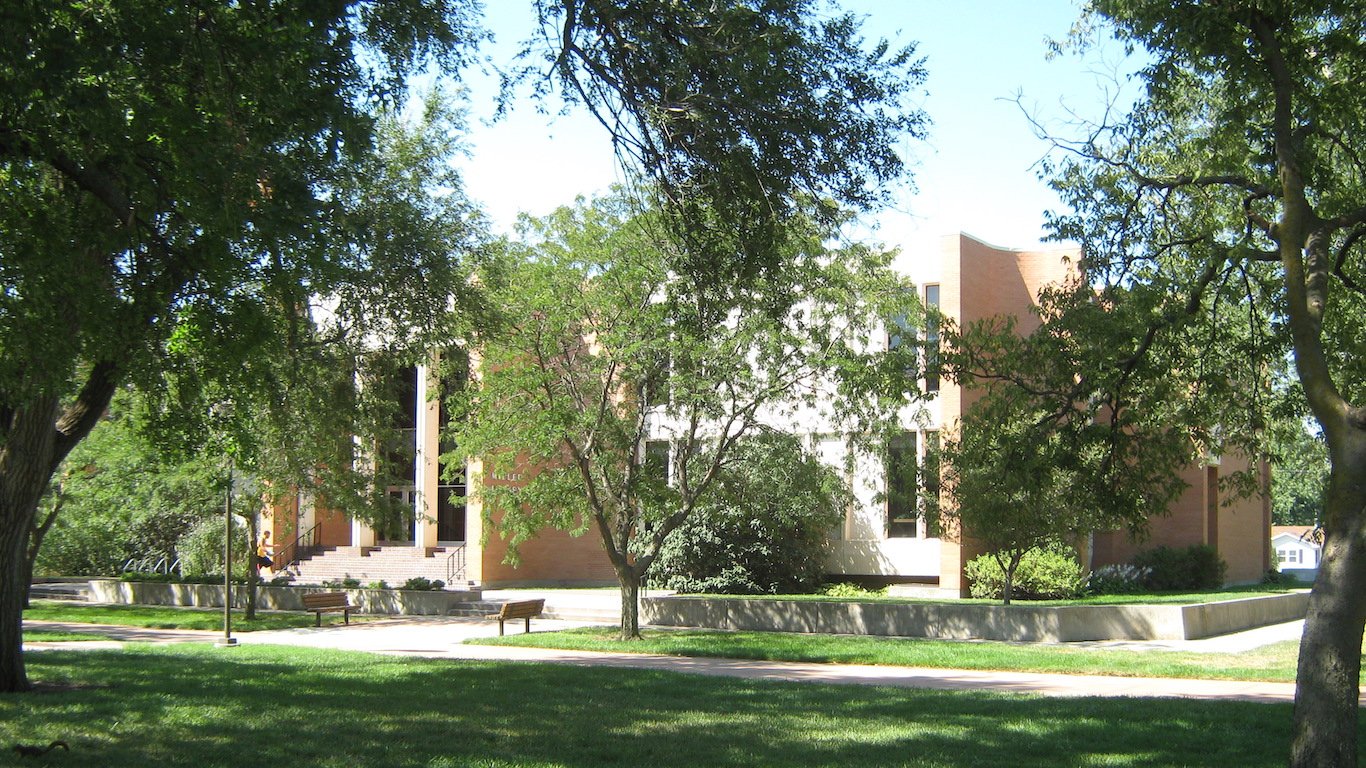
Kansas
> Most selective college: McPherson College
> Admission rate: 48.5%
> SAT at 25th and 75th percentiles: 1030 and 1180
> Annual net price of attendance: $21,954
This four-year liberal arts college in McPherson, Kansas, was founded in 1887 by leaders of the Church of the Brethren. The community is small, consisting of about 700 students, and the college offers 21 majors and 10 pre-professional programs, including business administration, chemistry, music, and psychology. The college puts an emphasis on entrepreneurship and preparing students for post-graduate studies. It also has the distinction of being the only school to offer a bachelor’s degree in automotive restoration.
[in-text-ad]
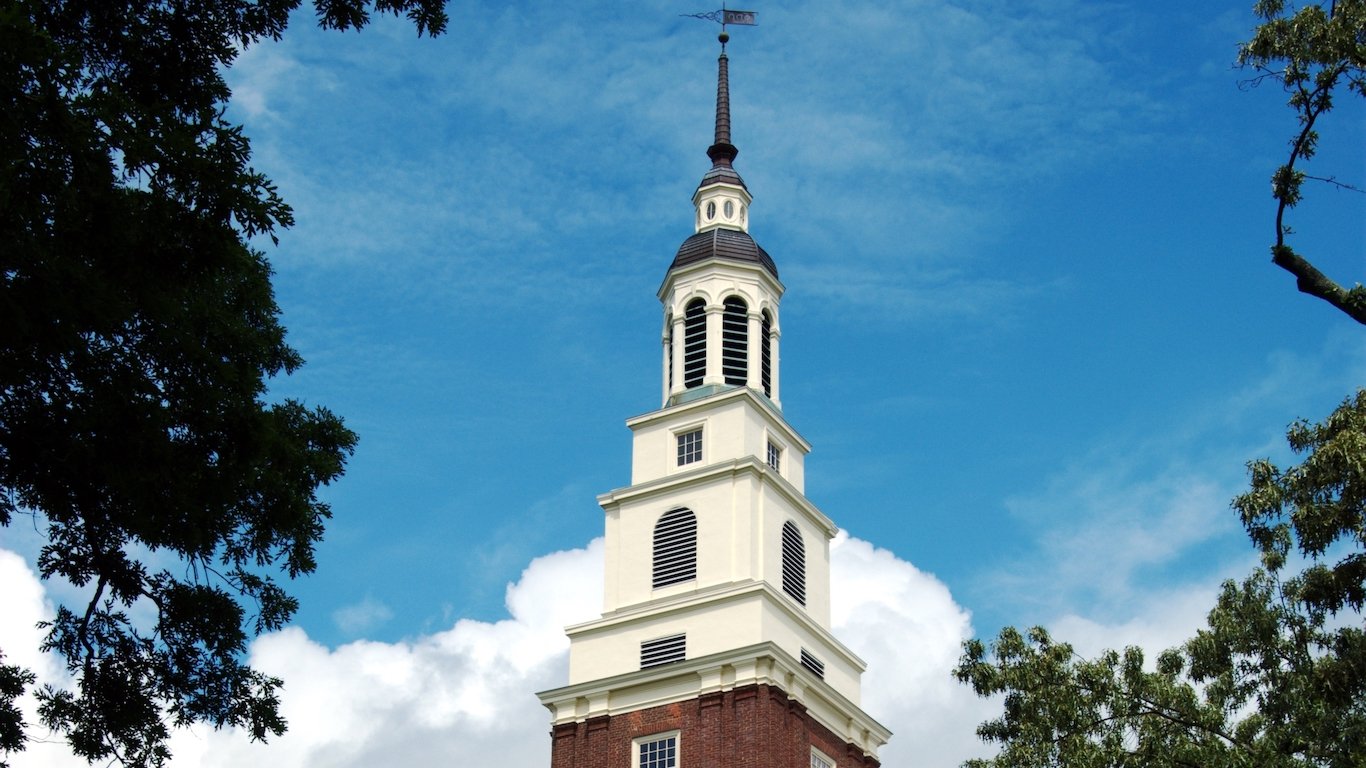
Kentucky
> Most selective college: Berea College
> Admission rate: 35.1%
> SAT at 25th and 75th percentiles: 970 and 1200
> Annual net price of attendance: $1,680
Berea was founded in 1855 as the first interracial and coeducational college in the South. The private liberal arts college, based in the city that shares its name, charges no tuition and admits only academically promising students, many of them from surrounding Appalachia, who have limited economic resources. The school, which has a student population of about 1,600, offers undergraduate degrees in the arts or sciences in 28 fields. In return for no tuition, students work for the campus in various roles, such as administrative, dining services and grounds maintenance. The school’s endowment covers 75% of its budget.
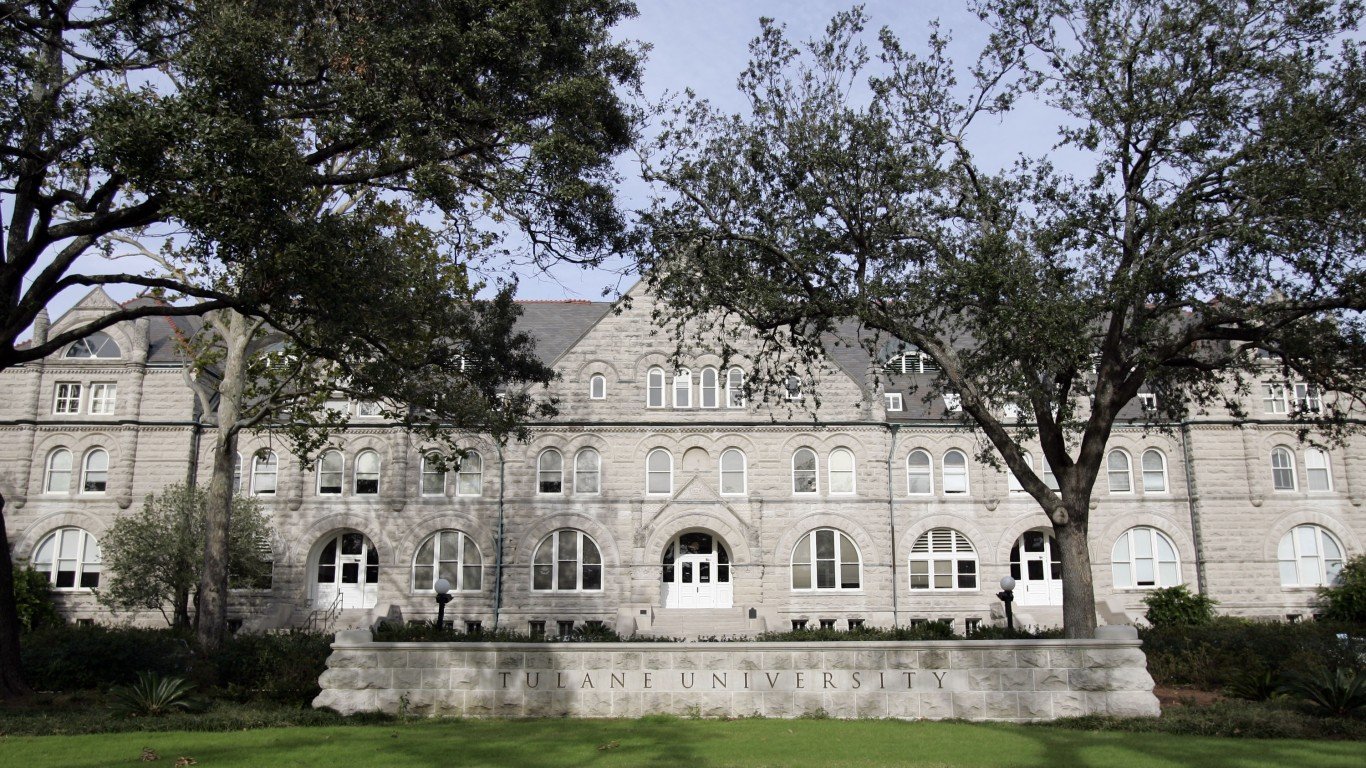
Louisiana
> Most selective college: Tulane University
> Admission rate: 21.5%
> SAT at 25th and 75th percentiles: 1330 and 1490
> Annual net price of attendance: $33,886
Founded as a medical college in 1834, Tulane is a private nonsectarian research university located in the lush Uptown district of New Orleans. The university offers 70 majors in its five schools and requires that students perform local community service as part of the curriculum, a tradition that dates back to when Tulane medical students worked to combat local outbreaks of yellow fever and cholera in the 1800s.
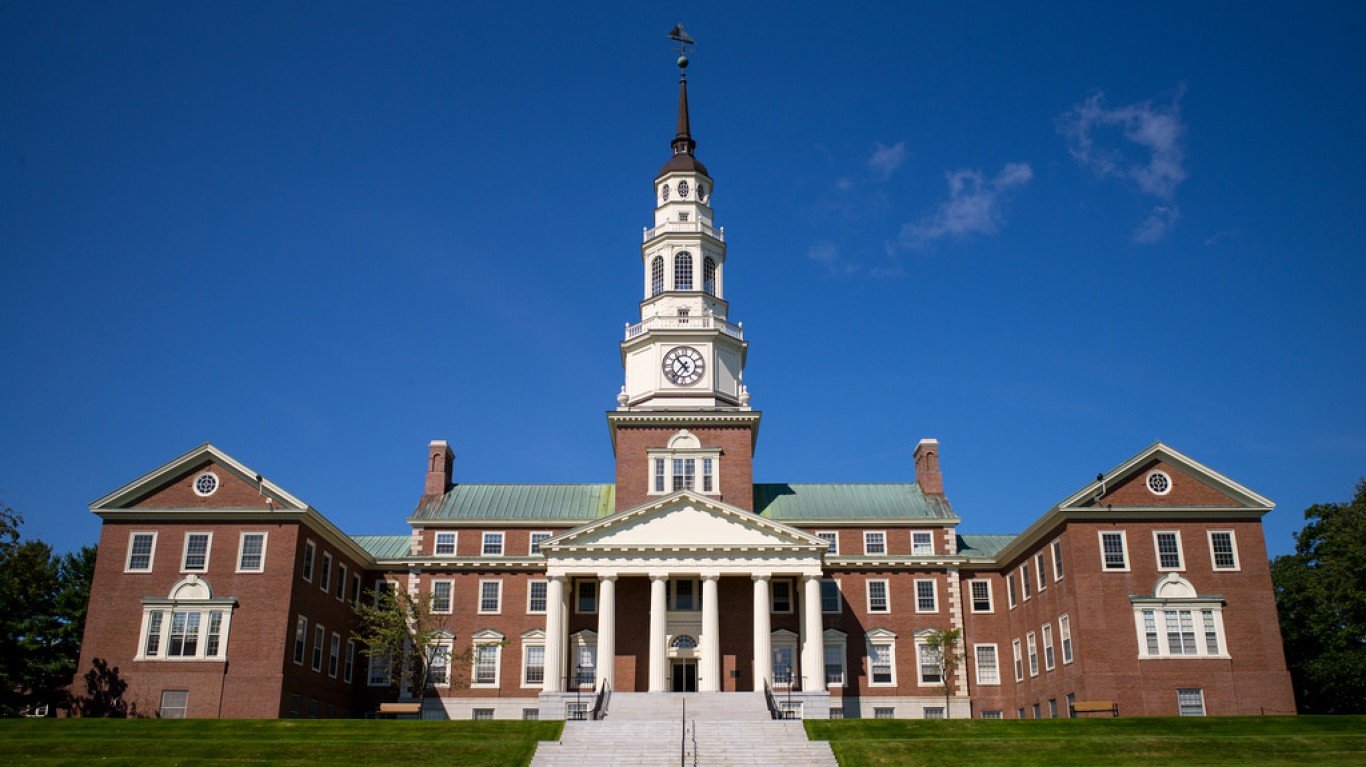
Maine
> Most selective college: Colby College
> Admission rate: 15.8%
> SAT at 25th and 75th percentiles: 1340 and 1500
> Annual net price of attendance: $20,361
This Waterville, Maine-based private liberal arts college was founded in 1813 as a literary and theological institution. Colby offers 58 majors and 35 minors and welcomes a student body of about 2,000. Despite its relatively small size, the college offers an extensive study-abroad program and provides undergraduate with research opportunities. Notable alumni include historian Doris Kearns Goodwin, ABC World News anchor Dan Harris, and celebrity chef Wylie Dufresne.
[in-text-ad-2]

Maryland
> Most selective college: Johns Hopkins University
> Admission rate: 12.5%
> SAT at 25th and 75th percentiles: 1450 and 1570
> Annual net price of attendance: $29,066
Named after an American Quaker, entrepreneur, slavery abolitionist, and university benefactor, Johns Hopkins University was founded in 1876 in Baltimore as a private research university. The university enrolls about 24,000 full- and part-time students across its nine academic divisions. It operates three health care-related schools devoted public health, nursing, and medicine, as well as Johns Hopkins Hospital. Its Applied Physics Laboratory plays an important role in U.S. space exploration, as it hosts the mission operations center for NASA’s New Horizons spacecraft, and its Peabody Institute was the country’s first academy of music.
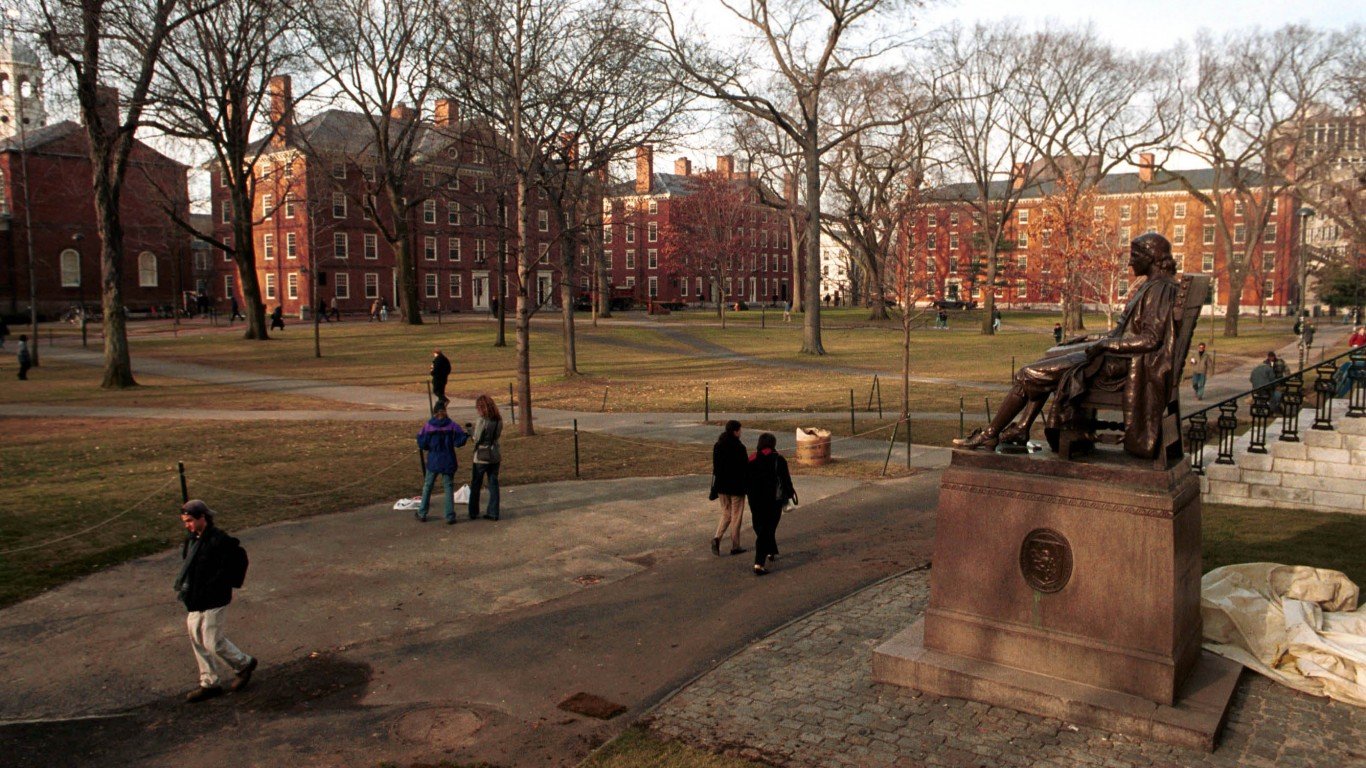
Massachusetts
> Most selective college: Harvard University
> Admission rate: 5.2%
> SAT at 25th and 75th percentiles: 1460 and 1590
> Annual net price of attendance: $17,030
The country’s oldest university â established in 1636 â is also the world’s richest with a massive $39 billion endowment as of 2018. Cambridge, Massachusetts-based Harvard is often the university associated with an Ivy League education and holds extremely high admissions standards. Harvard has a dozen schools and about 36,000 students attend, including about 16,000 who take courses at Harvard’s Extension School that offers non-degree and professional courses. The university has produced a long list of notable alumni, including 48 Nobel laureates, 32 heads of state, and 48 Pulitzers Prize winners.
[in-text-ad]
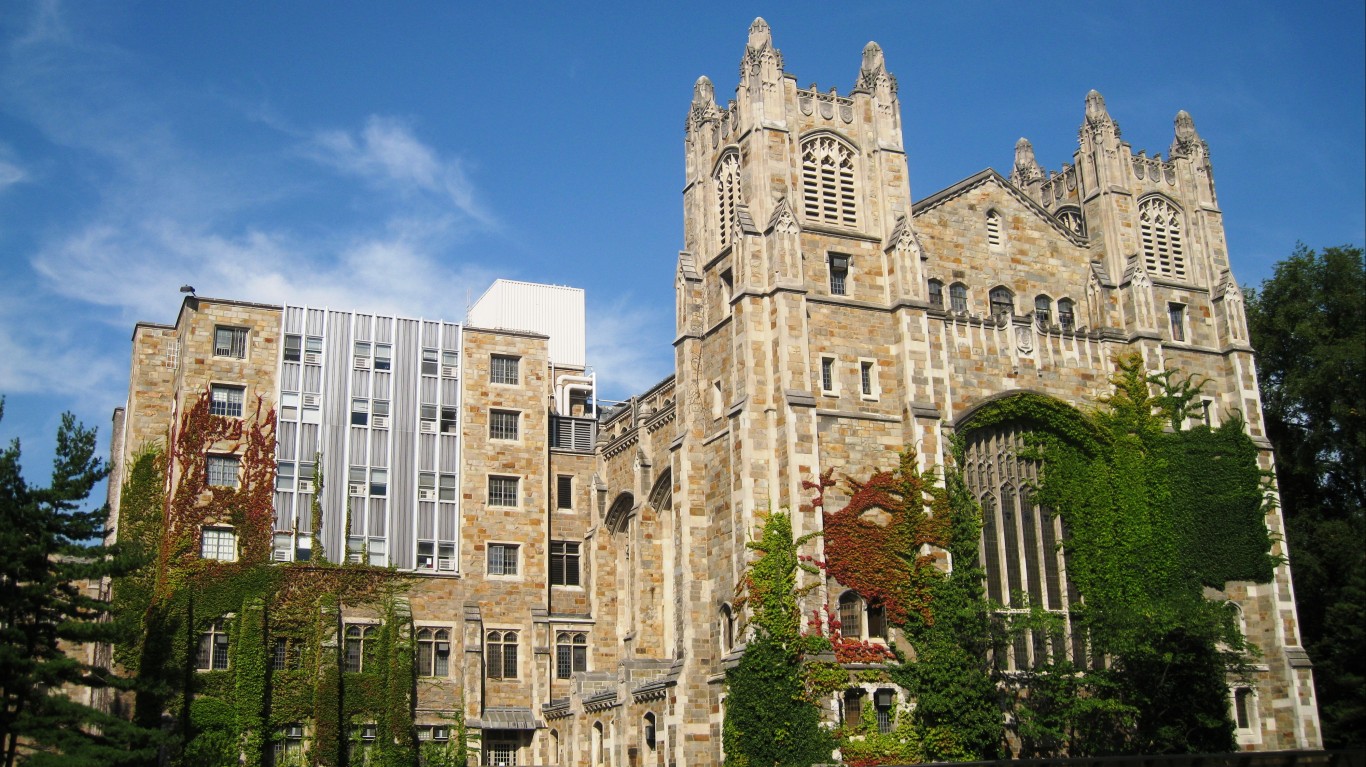
Michigan
> Most selective college: University of Michigan-Ann Arbor
> Admission rate: 26.5%
> SAT at 25th and 75th percentiles: 1330 and 1500
> Annual net price of attendance: $16,408
University of Michigan-Ann Arbor was founded in nearby Detroit in 1817, two decades before Michigan became a state. This public research university ranked among the top 10 universities in the nation as the best college (public or private) for the money, according to Money magazine’s 2018 ranking. UMich offers more than 275 degree programs and has a robust athletic program. The National Science Foundation ranks UMich among the top U.S. public universities in the nation for research. About 46,000 students attend UMich at Ann Arbor.

Minnesota
> Most selective college: Carleton College
> Admission rate: 21.2%
> SAT at 25th and 75th percentiles: 1360 and 1530
> Annual net price of attendance: $28,148
Northfield, Minnesota-based Carleton was founded in 1866 by a conference of Congregational churches and has the unusual distinction of operating on a trimester system of three 10-week terms annually. The non-denominational school offers 33 majors and 31 minors in the arts, humanities, natural sciences, mathematics and social sciences to the roughly 2,000 undergraduate students that attend each year. The college is small but sponsors an off-campus studies program that sends students to countries such as India, New Zealand, and Chile. The college says most students participate in its study abroad program at least once during their time there.

Mississippi
> Most selective college: Mississippi College
> Admission rate: 39.0%
> SAT at 25th and 75th percentiles: 1070 and 1290
> Annual net price of attendance: $17,098
This private Baptist college in Clinton, Mississippi, began teaching boys and girls in 1827, and it claims to be the first college in the nation to grant a degree to a woman, in 1831, though that claim is disputed by Wesleyan College in Macon, Georgia. The college offers more than 130 graduate and postgraduate areas of study, including law and medical sciences, to about 5,000 enrolled students. The college recently expanded its dyslexia diagnosis and therapy program, which treats children from across the state.
[in-text-ad-2]
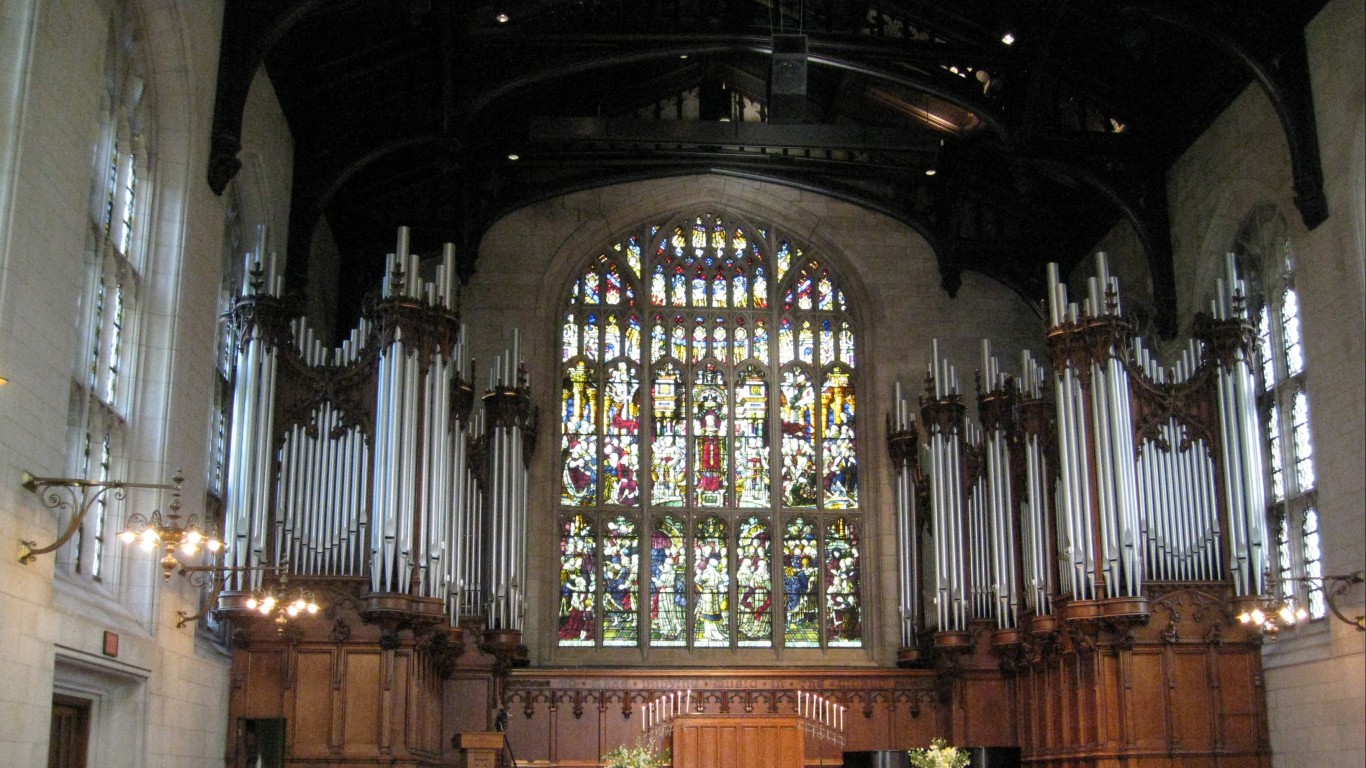
Missouri
> Most selective college: Washington University in St. Louis
> Admission rate: 16.0%
> SAT at 25th and 75th percentiles: 1470 and 1570
> Annual net price of attendance: $27,777
Founded in 1853, Washington University in St. Louis has some of the top undergraduate programs in the nation in field such as teaching, counseling, and engineering. This Missouri-based private research university has produced two dozen Nobel laureates, mostly in physiology and medicine. WashU has seven academic divisions, including architecture, business, and public health. It ranks high as the safety school choice for students who fail to be accepted to an Ivy League university. Its student population hovers around 15,000.

Montana
> Most selective college: Rocky Mountain College
> Admission rate: 64.4%
> SAT at 25th and 75th percentiles: 910 and 1150
> Annual net price of attendance: $20,276
Rocky Mountain College in Billings, Montana, was founded in 1878 and is historically affiliated with the Presbyterian Church, the United Methodist Church, and the United Church of Christ. This private college offers dozens of majors and four post-graduate programs in occupational therapy, education, accounting, and physician assistant studies. The campus is small, with only about 1,000 students.
[in-text-ad]
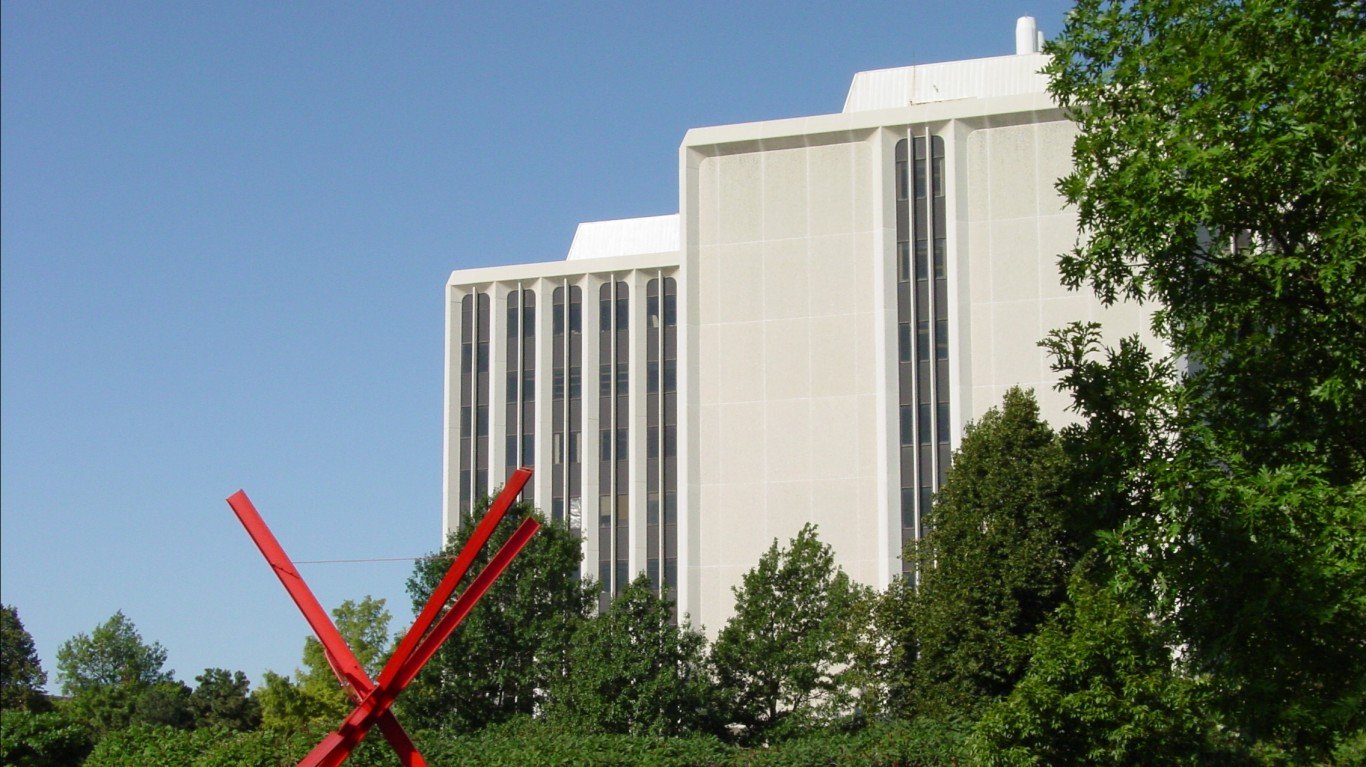
Nebraska
> Most selective college: University of Nebraska-Lincoln
> Admission rate: 64.4%
> SAT at 25th and 75th percentiles: 1100 and 1380
> Annual net price of attendance: $16,813
UNL, a public research university, is Nebraska’s oldest university, founded in 1869. The state’s flagship university is also home to the popular Huskers athletic program, a member of the Big Ten Conference. UNL has 10 colleges teaching subject including agricultural science, architecture, journalism, engineering, and law. Like most public state universities, the student population is relatively large, consisting of more than 25,000 students in fall 2018, its third largest semester enrollment number. Notable Husker alumni include Twitter co-founder Ev Williams, billionaire Warren Buffett, and former U.S. Poet Laureate Ted Kooser.

Nevada
> Most selective college: Sierra Nevada College
> Admission rate: 69.0%
> SAT at 25th and 75th percentiles: 910 and 1140
> Annual net price of attendance: $28,679
Founded in 1969, SNC is the youngest institution on this list. This private, liberal arts college located on the north shore of scenic Lake Tahoe focuses on environmental science, creative writing, humanities, and teacher education. Located so close to Nevada’s ski slopes, SNC also offers courses in ski area management. In total, it offers more than 20 undergraduate majors through its six departments, as well as postgraduate programs in education. Last year, it lowered tuition to in-state students seeking to complete their four-year degrees through the college’s extension program.

New Hampshire
> Most selective college: Dartmouth College
> Admission rate: 10.4%
> SAT at 25th and 75th percentiles: 1430 and 1560
> Annual net price of attendance: $22,303
Based in Hanover, New Hampshire, Dartmouth is one of the oldest higher education institutions in the country, founded in 1769. It is considered an Ivy League-level private research university, with a student body of about 6,500. Like many other Ivy League schools, it has a low admission rate. Just 10.4% of applicants are accepted. Notable alumni include comic actress and producer Mindy Kaling, sports medicine pioneer Freddie Fu, and former U.S. Labor Secretary Robert Reich.
[in-text-ad-2]

New Jersey
> Most selective college: Princeton University
> Admission rate: 6.4%
> SAT at 25th and 75th percentiles: 1430 and 1570
> Annual net price of attendance: $16,302
Established in 1746, Princeton is one of the oldest institutions of higher education nationwide and a top private research university. The Ivy League university has one of the smallest student-to-faculty ratios, at just five to one. (The average in the United States is 18 to one.) From its 37 departments, Princeton offers 18 master’s degrees programs and 33 doctoral programs. About 7,000 students attend Princeton. Princeton’s Woodrow Wilson School of Public and International Affairs is a leading educator of government leaders, like senators Jeff Merkley, Bill Frist, and Ted Cruz. while its Plasma Physics Laboratory is a leading nuclear fusion research center.

New Mexico
> Most selective college: New Mexico Institute of Mining and Technology
> Admission rate: 21.7%
> SAT at 25th and 75th percentiles: 1190 and 1390
> Annual net price of attendance: $13,741
New Mexico Tech is considered one of the best small science and engineering schools in the country. Located in Socorro, an hour’s drive south of Albuquerque, the school was founded in 1893 to teach mining expertise. But today the curriculum has evolved to include atmospheric physics, information technology, earth science, mechanical engineering, and petroleum extraction. It offers 48 bachelor’s degree programs to a small student population of about 1,400.
[in-text-ad]
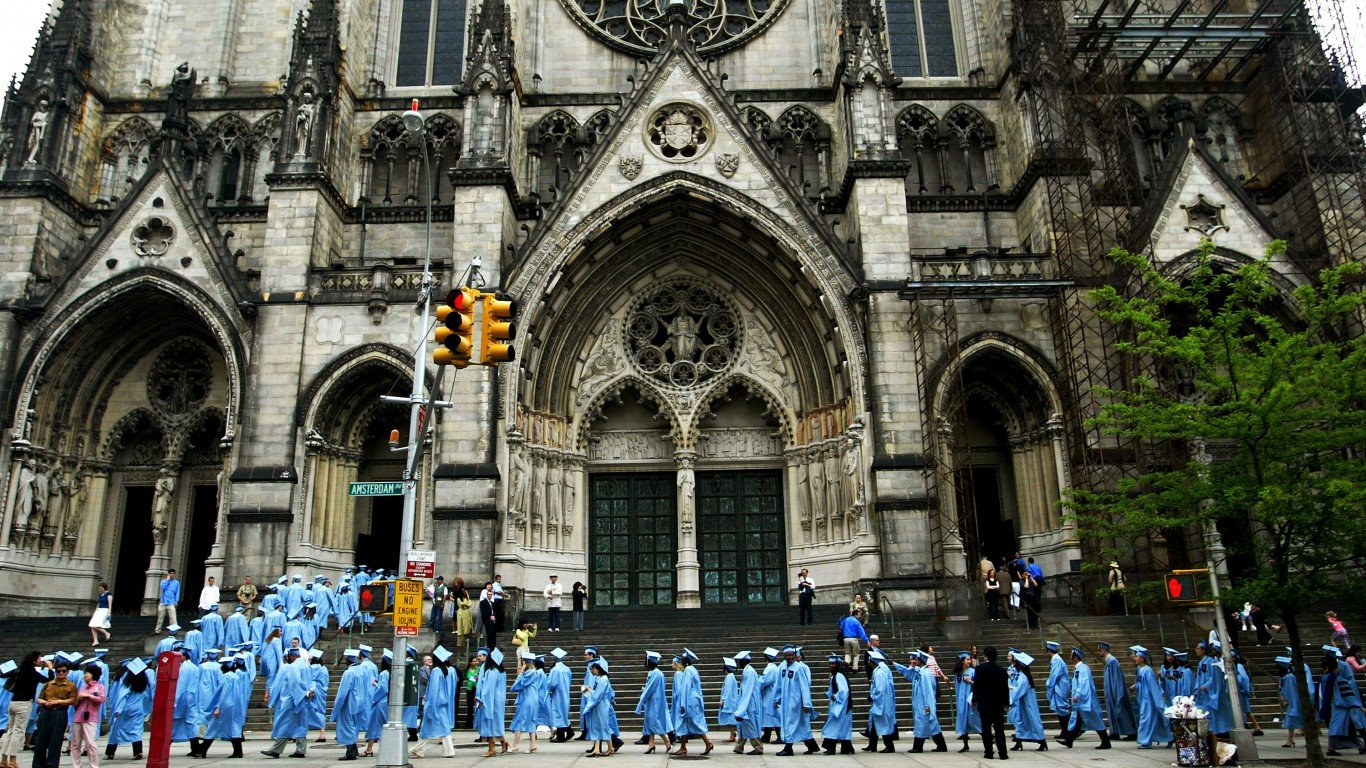
New York
> Most selective college: Columbia University
> Admission rate: 6.6%
> SAT at 25th and 75th percentiles: 1410 and 1570
> Annual net price of attendance: $22,824
Based in Manhattan’s upper west side, Columbia is one of the oldest universities in the country â founded in 1754 — and among the top higher education institutions in the world. The total student population was about 33,000 last year, with about half enrolled in its nine graduate and professional schools. Notable alumni include Alexander Hamilton, CNN anchor Poppy Harlow, and former attorney general Eric Holder.
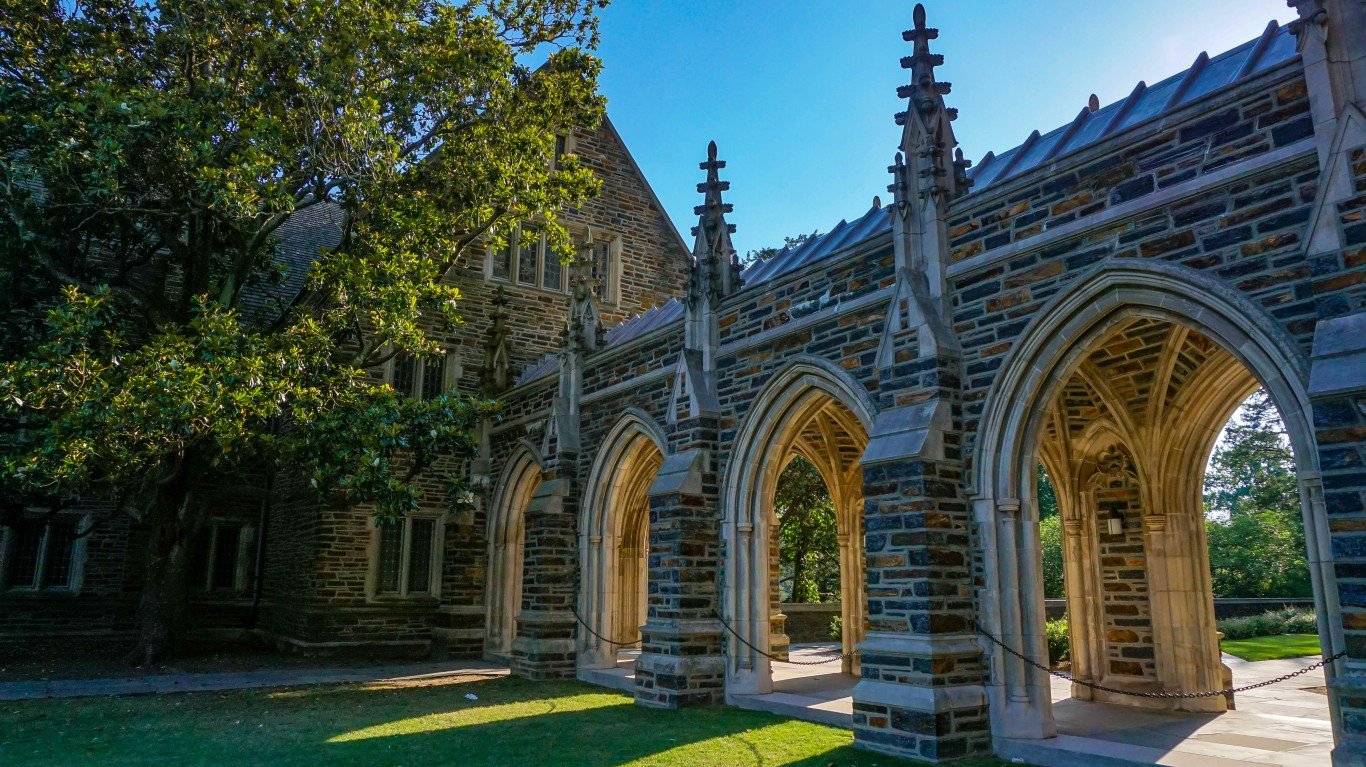
North Carolina
> Most selective college: Duke University
> Admission rate: 9.9%
> SAT at 25th and 75th percentiles: 1380 and 1540
> Annual net price of attendance: $22,011
Durham, North Carolina-based Duke University was founded by Methodists and Quakers in 1838 as a subscription school. The school had several named before it was ultimately renamed Duke University in 1924. Today, Duke is a major private research university with an undergraduate and graduate student population of nearly 16,000, largely pursuing majors in computer science, economics, public policy, biology, and psychology. Notable alumni include Apple CEO Tim Cook, philanthropist Melinda French Gates, and PBS NewsHour anchor Judy Woodruff.
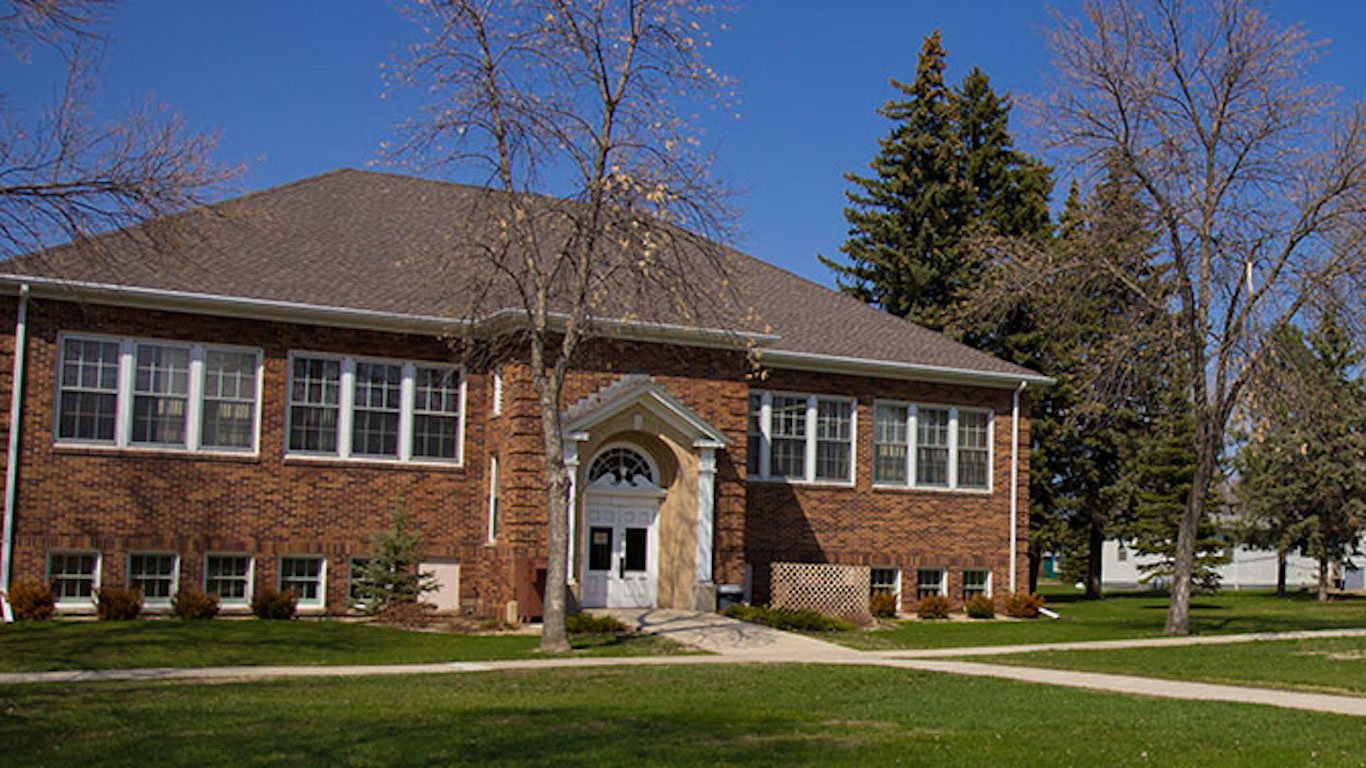
North Dakota
> Most selective college: Trinity Bible College and Graduate School
> Admission rate: 42.4%
> SAT at 25th and 75th percentiles: 995 and 1230
> Annual net price of attendance: $20,408
This school in Ellendale, North Dakota, is one of the younger ones on this list, founded in 1948. As the name implies, the school maintains a deep religious foundation, affiliated with the Assemblies of God USA, and considers itself a leading U.S. Pentecostal Bible college. The school offers bachelor’s degrees in information systems, marketing and communications, and biblical studies, and ministry. Its graduate programs are focused on mission work.
[in-text-ad-2]
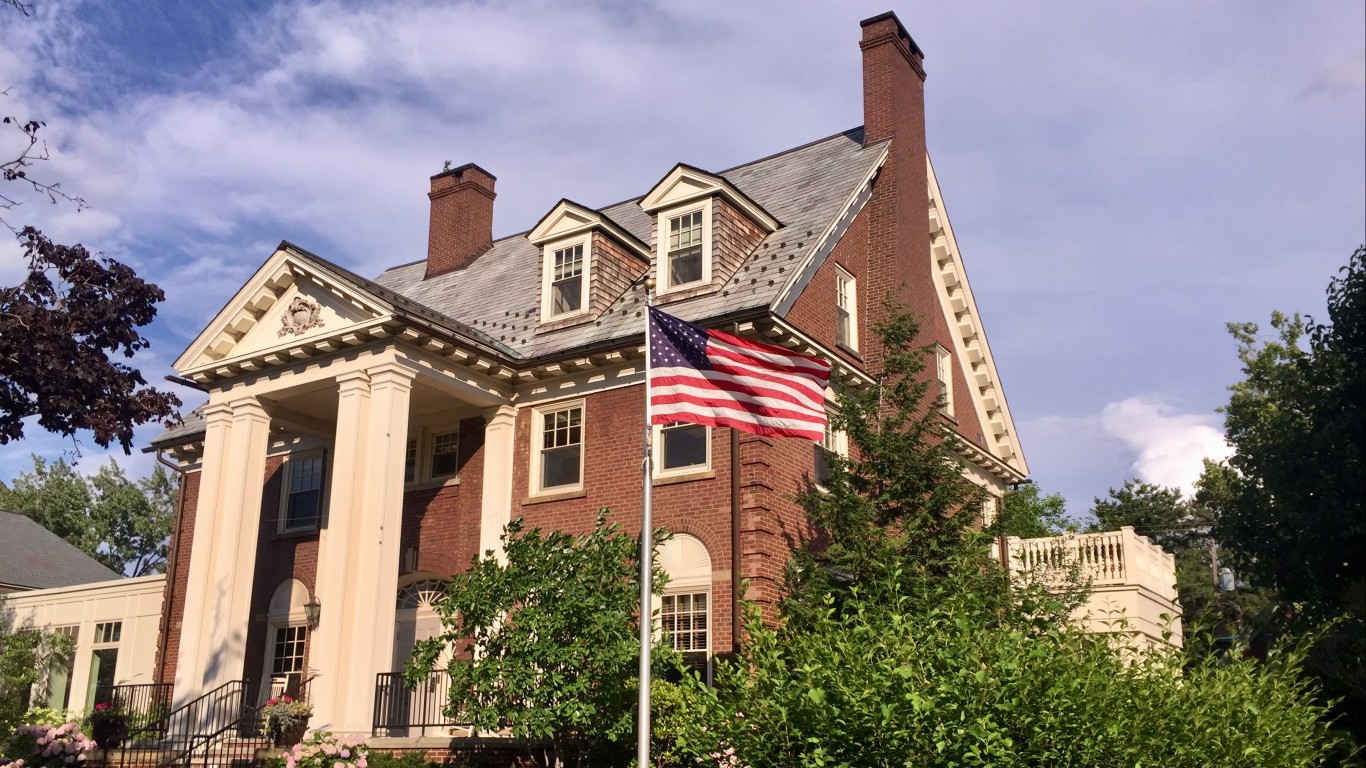
Ohio
> Most selective college: Case Western Reserve University
> Admission rate: 33.1%
> SAT at 25th and 75th percentiles: 1340 and 1520
> Annual net price of attendance: $34,973
This Cleveland-based private research university was established in 1967 from a merger of two older local institutions dating back to the early 1800s. The university has eight colleges and schools focused on nursing, medicine, dental medicine, engineering, law, and management. Its School of Graduate Studies offers dozens of master’s degree and doctoral programs. The university student population numbers about 12,000. Notable alumni from its engineering school include Craigslist founder Craig Newmark, personal computer pioneer Paul Freidl, and Gmail creator Paul Buchheit.

Oklahoma
> Most selective college: University of Tulsa
> Admission rate: 39.0%
> SAT at 25th and 75th percentiles: 1150 and 1440
> Annual net price of attendance: $25,086
Founded in 1894 by the Presbyterian Church as an offshoot of a school for Native American girls, the University of Tulsa is a non-denominational private research university offering undergraduate and graduate degrees in disciplines such as law, literature, psychology, and computer science. Enrollment in the 2017-2018 school year was about 4,400 students. The university manages the Gilcrease Museum, one of the largest collections of American Western art.
[in-text-ad]
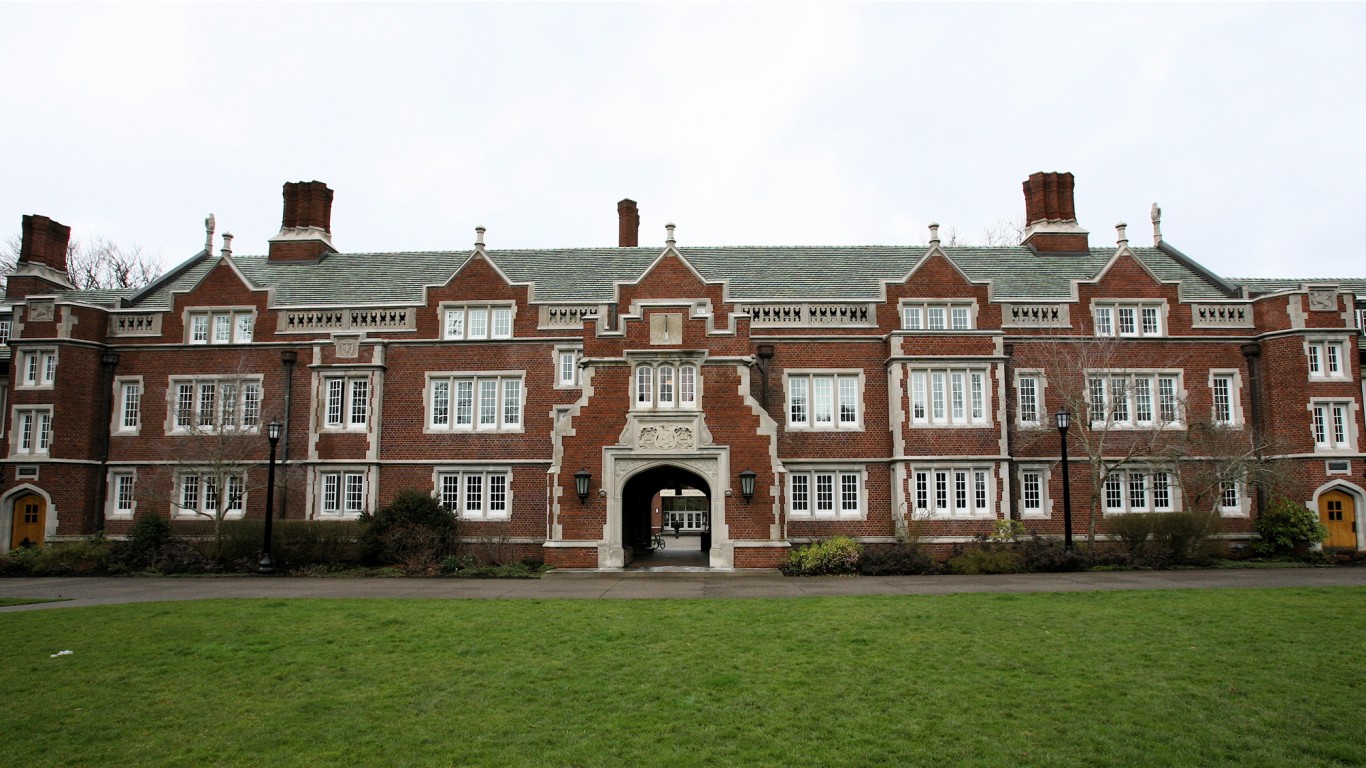
Oregon
> Most selective college: Reed College
> Admission rate: 35.6%
> SAT at 25th and 75th percentiles: 1310 and 1500
> Annual net price of attendance: $32,097
Reed is a small private liberal arts college in Portland that was founded in 1908. The college requires all students to take a yearlong humanities course. The student population hovers around 1,400. Graduate students are not required to declare a focus and can craft their own curriculums. Reed has dual-degree options in which students can also pursue computer science or engineering degrees from the University of Washington, the California Institute of Technology, Columbia University, or the Rensselaer Polytechnic Institute.

Pennsylvania
> Most selective college: University of Pennsylvania
> Admission rate: 9.3%
> SAT at 25th and 75th percentiles: 1420 and 1560
> Annual net price of attendance: $24,539
The private Ivy League research institution in West Philadelphia is among the oldest in the country, established in 1740 at the urging of U.S. founding father Benjamin Franklin. It consistently ranks among the top schools in the world. Like others in its league, the student-faculty ratio is small at six to one. It has a relatively high student population of around 26,200. UPenn boasts having the world’s first business school, Wharton, as well as the first medical school in the United States. As a premiere institution, it boasts a long list of famous alumni, including recent notables such as late businessman and philanthropist Jon Huntsman Sr., CEO of Tesla and SpaceX Elon Musk, and President Donald Trump.

Rhode Island
> Most selective college: Brown University
> Admission rate: 8.5%
> SAT at 25th and 75th percentiles: 1405 and 1570
> Annual net price of attendance: $25,651
Yet another of the country’s oldest universities makes this list as one of the most challenging to be accepted to. Brown University, established in 1764, was the first institution of higher education in the United States to accept students regardless of their religious affiliation. Brown offers about 2,000 courses in 40 academic departments and allows its undergraduates to design individualized programs. Enrollment stands at around 9,700 undergraduate, graduate, and medical school students. Recent notable alumni include CNN founder Ted Turner, actress Emma Watson, and former Federal Reserve Chair Janet Yellen.
[in-text-ad-2]

South Carolina
> Most selective college: Clemson University
> Admission rate: 47.2%
> SAT at 25th and 75th percentiles: 1220 and 1390
> Annual net price of attendance: $18,757
Clemson started out as an agricultural-focused, all-male military school and became a coeducational public civilian university in 1955. The university has received in recent years accolades from U.S. News and World Reports for the value of its education and its career services. Clemson enrolls nearly 25,000 students, including about 2,800 graduate students, who take courses at the university’s seven colleges. Notable alumni include late U.S. Sen. Strom Thurmond, late U.S. Secretary of State James F. Byrnes, and former U.S. ambassador the United Nations Nikki Haley.
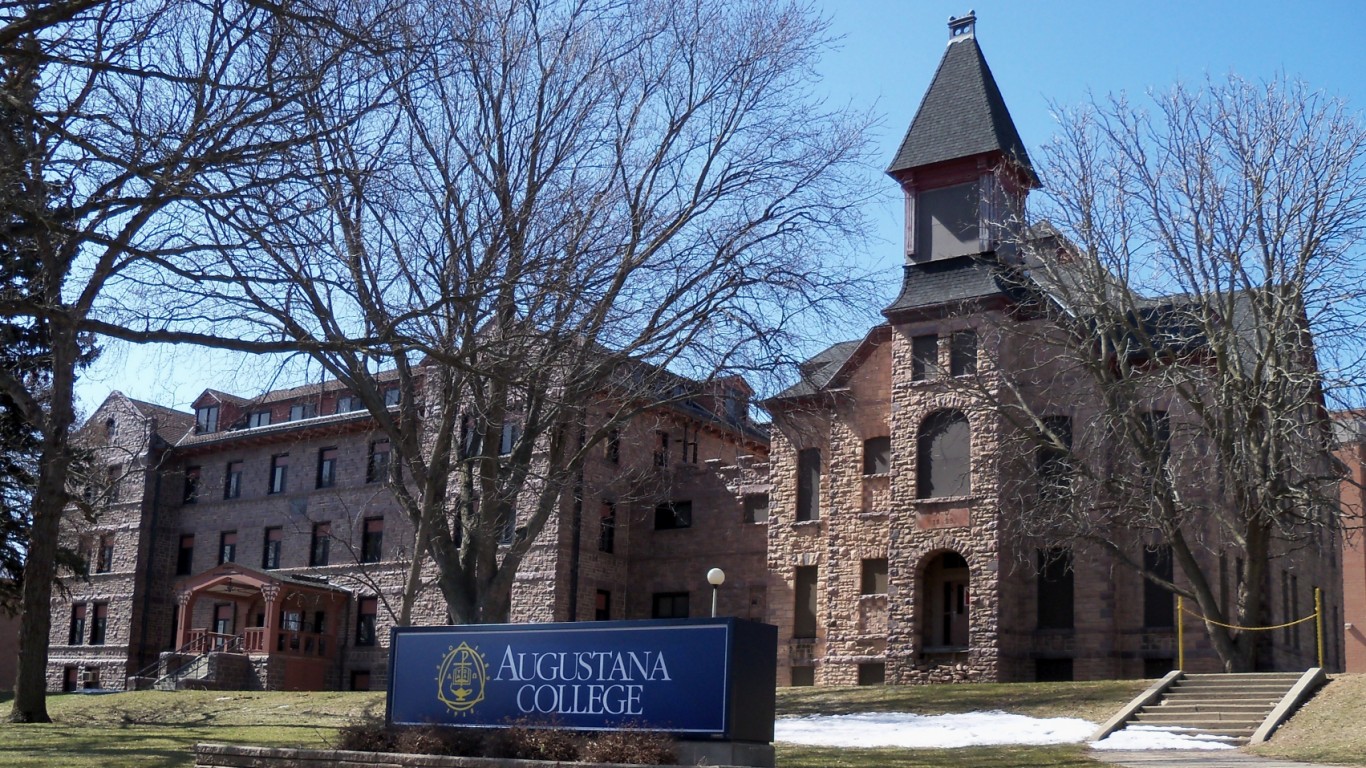
South Dakota
> Most selective college: Augustana University
> Admission rate: 67.8%
> SAT at 25th and 75th percentiles: 1070 and 1290
> Annual net price of attendance: $18,937
Augustana is a Sioux Falls-based private liberal arts university founded in 1860, affiliated with the Evangelical Lutheran Church. It is the largest private institution of higher education in the state. The university offers dozens of bachelor’s degree programs and pre-professional curriculums, notably nursing. Augustana has more than 2,100 students, from 29 states and 36 countries.
[in-text-ad]
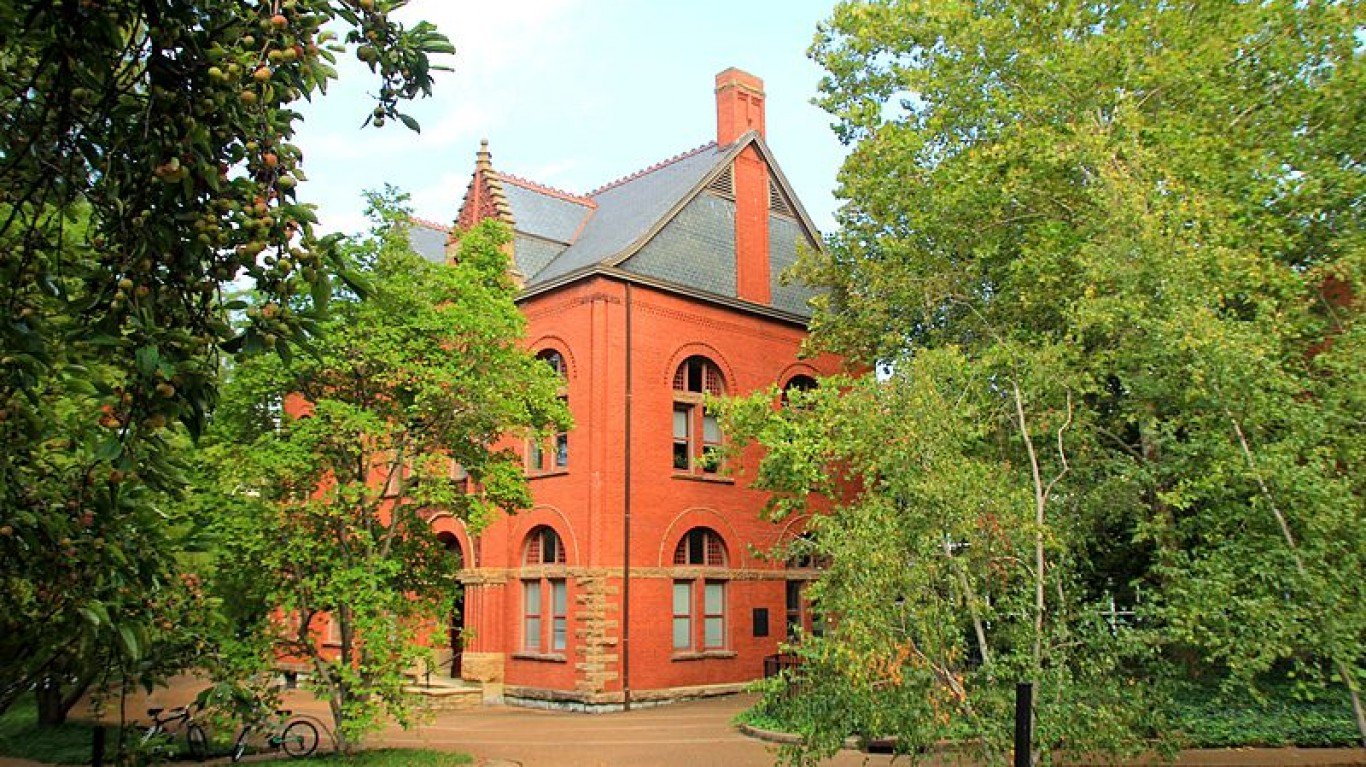
Tennessee
> Most selective college: Vanderbilt University
> Admission rate: 10.9%
> SAT at 25th and 75th percentiles: 1440 and 1570
> Annual net price of attendance: $23,295
Nashville-based Vanderbilt is Tennessee’s premiere private research university that enrolls approximately 12,600 students. Vanderbilt has several schools focused on a wide range of disciplines, including music, arts and sciences, nursing, medicine, management, and law. Its Peabody College focuses on human development in different areas, such as education, public policy, and psychology. Notable alumni include Nobel Peace Prize-winning micro-lending pioneer Muhammad Yunus, Nobel Prize winner for Chemistry Stanford Moore, and civil rights leader Rev. James Lawson.
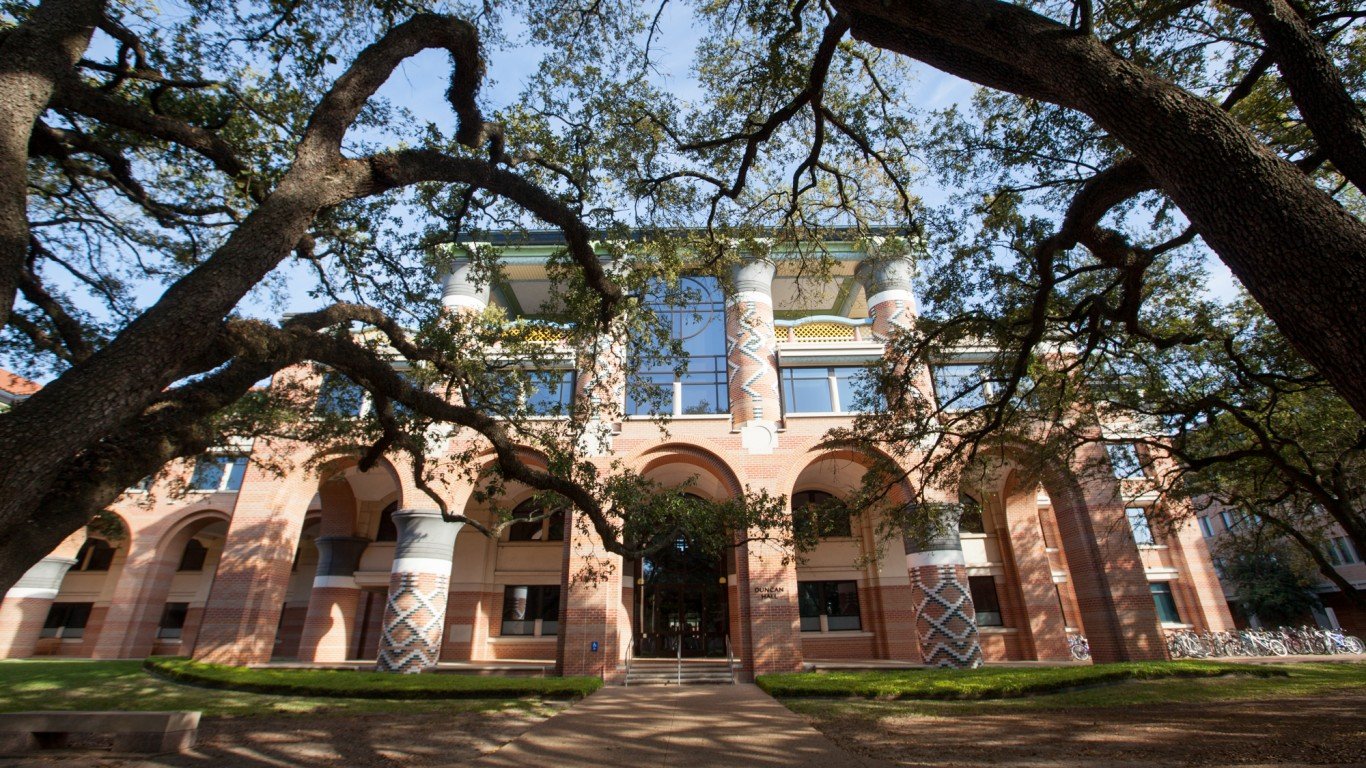
Texas
> Most selective college: Rice University
> Admission rate: 15.9%
> SAT at 25th and 75th percentiles: 1490 and 1580
> Annual net price of attendance: $24,131
Located in Houston, Rice is a private research university that was established in 1912 as a coeducational institution. Today Rice has eight schools focused on natural sciences, business, engineering humanities, social sciences, architecture, and music. Student enrollment numbered nearly 4,000 in the fall of 2018. Rice boasts a small faculty-student ratio of six to one, well below the national average of 18 to 1. Notable alumni include astronauts Janice Voss, Shannon Walker and James H. Newman, and novelist Larry McMurtry.

Utah
> Most selective college: Brigham Young University-Provo
> Admission rate: 52.4%
> SAT at 25th and 75th percentiles: 1210 and 1410
> Annual net price of attendance: $12,979
Utah’s largest university is private and caters to adherents to the Church of Jesus Christ of Latter-day Saints. BYU offers dozens of master’s and doctoral degree programs as well undergraduate education. Like other religious schools, students are expected to take some religious education and to adhere to an honor code in accordance to religious teachings. It is a major institution with more than 30,000 undergraduate students and 179 undergraduate majors. Followers of the church get a sizeable discount on tuition.
[in-text-ad-2]

Vermont
> Most selective college: Middlebury College
> Admission rate: 17.1%
> SAT at 25th and 75th percentiles: 1320 and 1510
> Annual net price of attendance: $22,841
This private liberal arts college in Middlebury was the first institution of higher education in the state, founded in 1800. The nondenominational college emphasizes writing skills in all of its disciplines in order to hone critical thinking and expression in all of its students, regardless of major. The school enrolls about 2,500 undergraduate students and 750 graduate students at its Middlebury Institute of International Studies. Middlebury received a record 9,750 number of applications for the class of 2023.
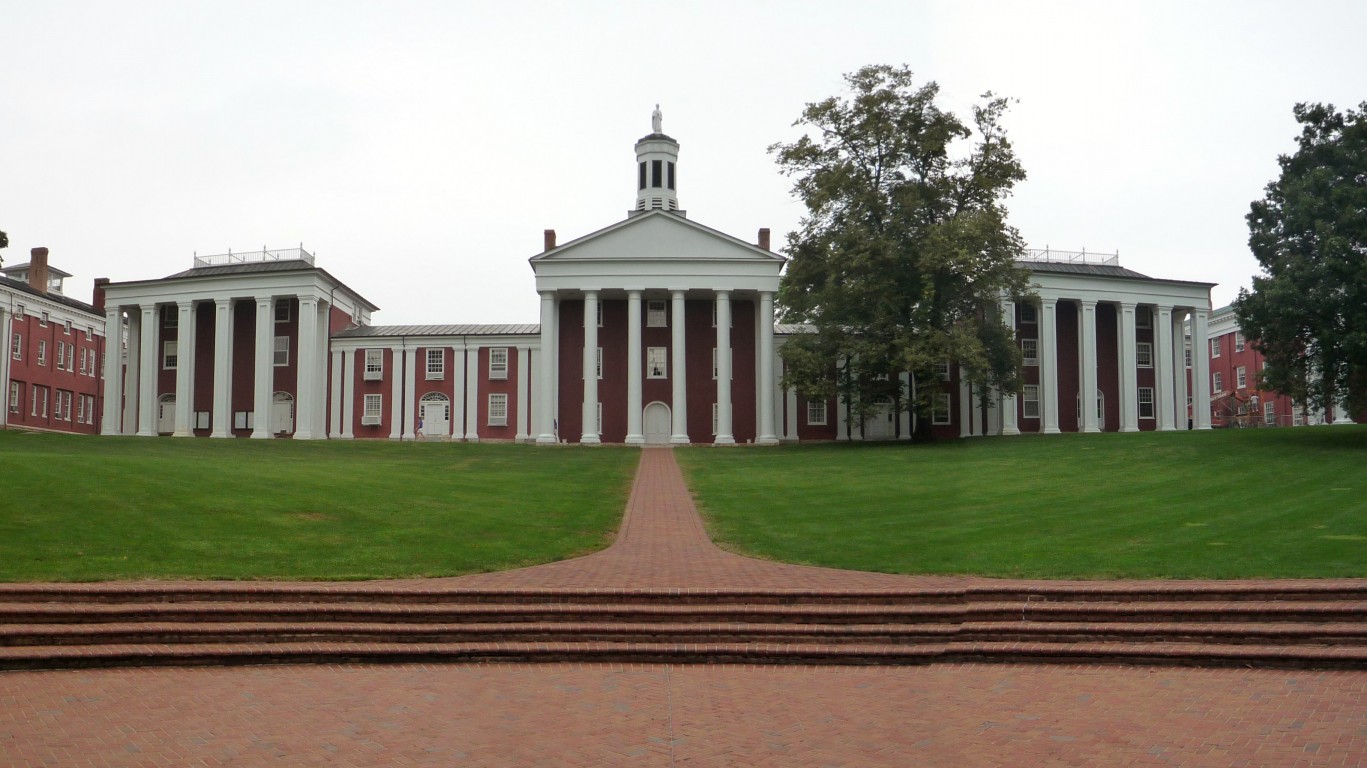
Virginia
> Most selective college: Washington and Lee University
> Admission rate: 22.0%
> SAT at 25th and 75th percentiles: 1350 and 1490
> Annual net price of attendance: $25,029
Like several other universities on this list, this private liberal arts university in Lexington is one of the oldest in the nation, founded in 1749. Washington and Lee’s main college offers bachelor’s degrees in 21 departments with 37 different majors. The university also has schools for business, law, and ethics. The institution is ranked 11th on the most recent list of best U.S. liberal arts colleges by U.S. News and World Report. The university’s law school has produced two U.S. Supreme Court justices, eight state governors, and 15 members of congress.
[in-text-ad]
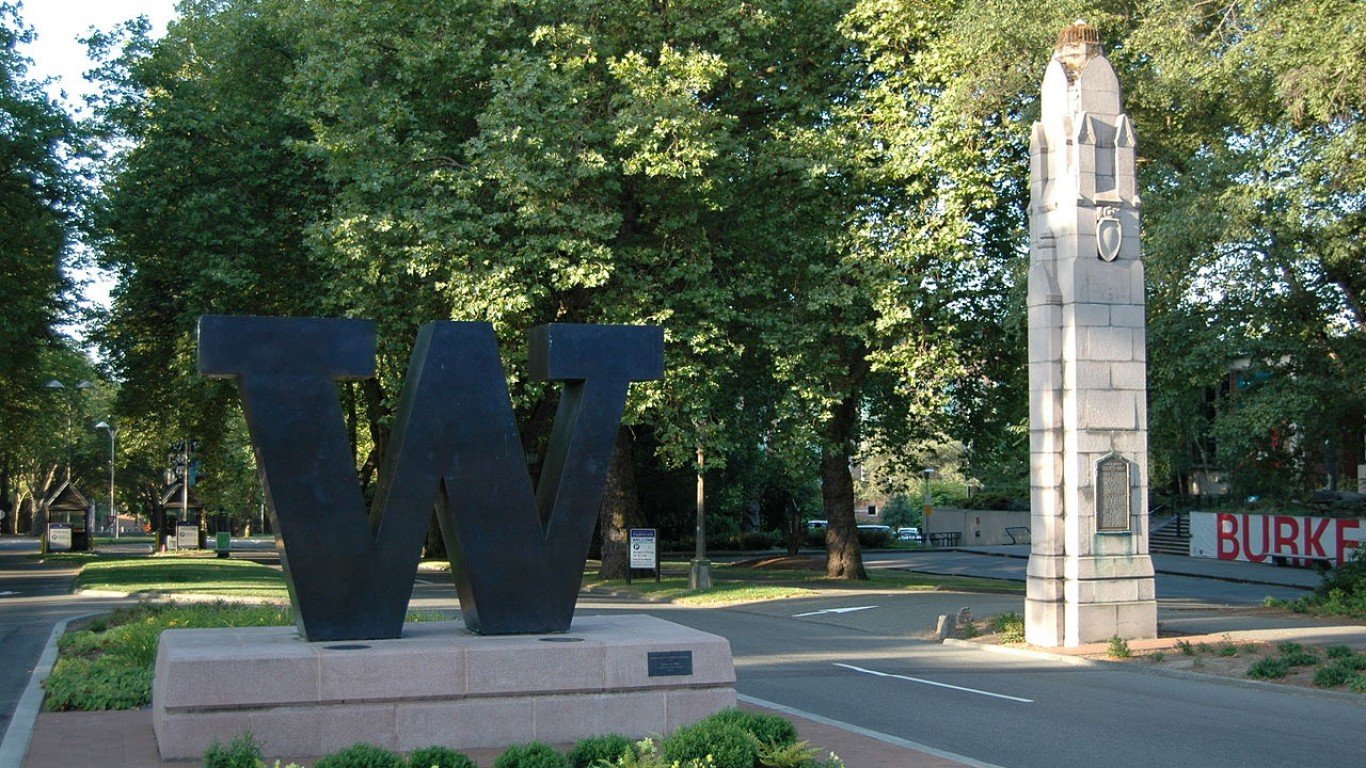
Washington
> Most selective college: University of Washington-Seattle Campus
> Admission rate: 46.4%
> SAT at 25th and 75th percentiles: 1190 and 1420
> Annual net price of attendance: $9,443
U-Dub, as it is casually known, was established in 1861 and is the oldest public university on the West Coast. The university has 15 colleges and schools covering a broad range of disciplines, including urban planning, dentistry, law, and public health. MySpace co founder Chris DeWolfe, actor Joel McHale, and creator of the MS-DOS operating system Tim Paterson are among the alumni.
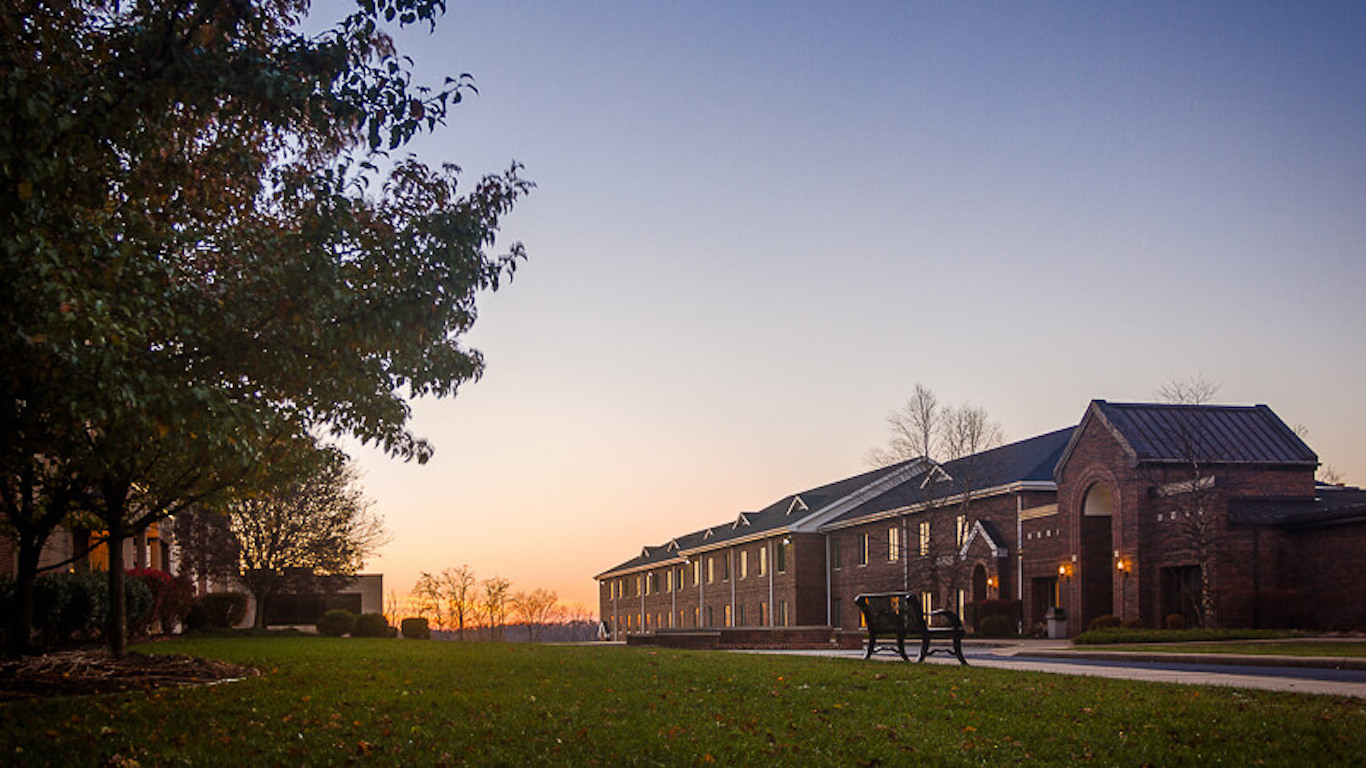
West Virginia
> Most selective college: Ohio Valley University
> Admission rate: 28.6%
> SAT at 25th and 75th percentiles: 910 and 1110
> Annual net price of attendance: $17,613
Ohio Valley University is a private religious college affiliated with the Church of Christ that opened its doors to students in 1960, making it one of the youngest institutions on this list. OVU integrates a religious education with bachelor’s degree courses. Majors include biochemistry, criminal justice, English, forensic accounting, and, of course, studies in the Bible and ministry. The college offers study-abroad opportunities in Rome, Jerusalem, London, and Paris.
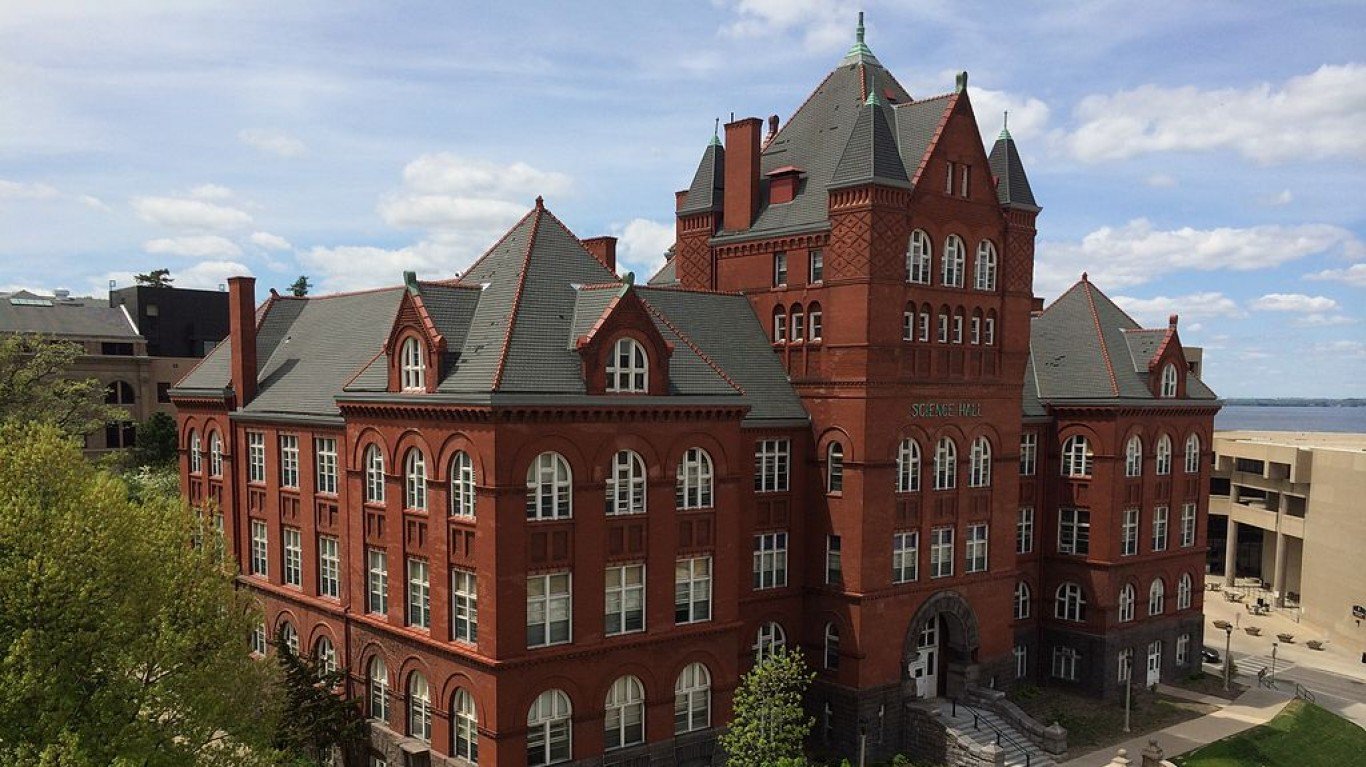
Wisconsin
> Most selective college: University of Wisconsin-Madison
> Admission rate: 53.8%
> SAT at 25th and 75th percentiles: 1280 and 1450
> Annual net price of attendance: $15,910
The University of Wisconsin-Madison was founded in 1848 and is the first and largest public university in the state. The university has 13 schools and colleges and about 44,400 students as of the fall of 2018, including nearly 9,000 graduate students. The school offers more than 200 undergraduate majors and more than 250 master’s, doctoral, or professional programs. Notable alumni include former U.S. Vice President Dick Cheney, historian Stephen Ambrose, and Pulitzer Prize-winning journalist Anthony Shadid.
[in-text-ad-2]
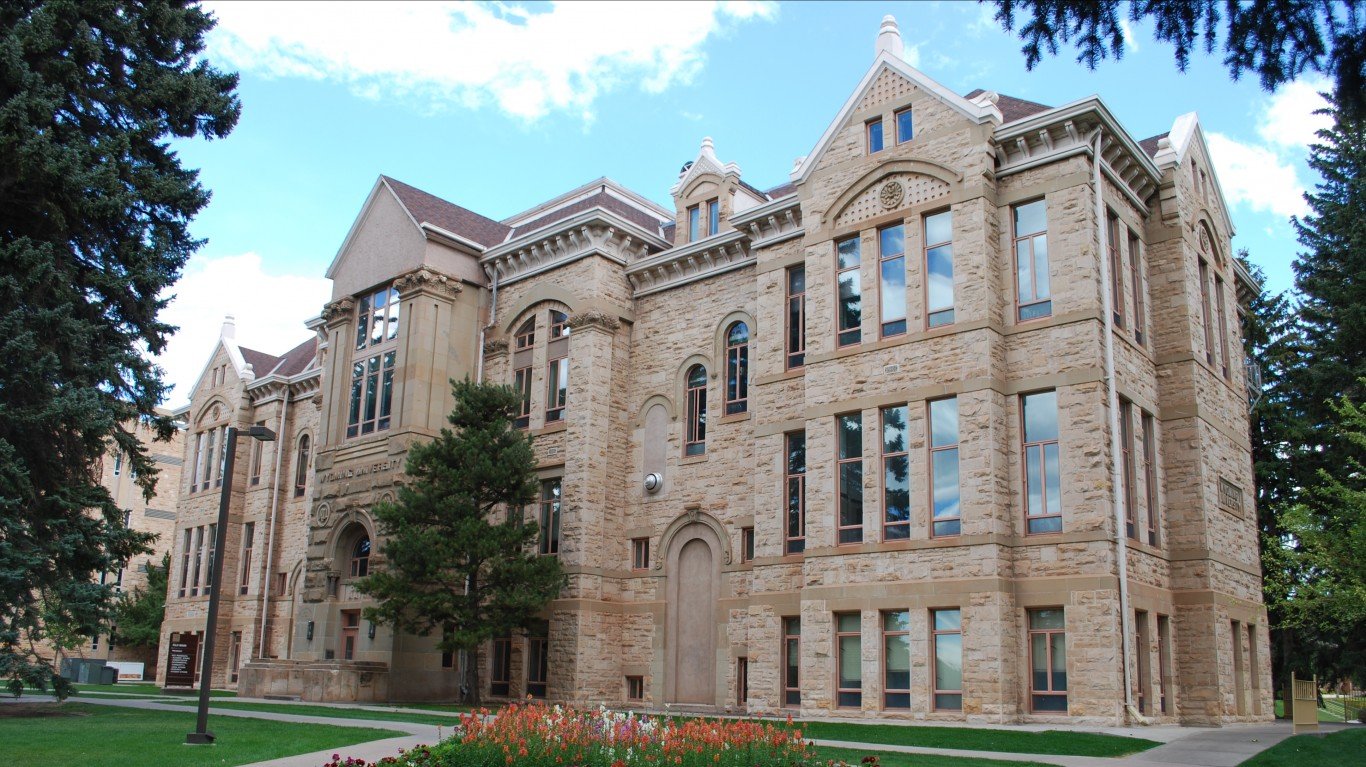
Wyoming
> Most selective college: University of Wyoming
> Admission rate: 96.8%
> SAT at 25th and 75th percentiles: 1040 and 1290
> Annual net price of attendance: $13,441
The University of Wyoming, founded in 1886, is a public institution based in Laramie. The university offers more than 120 degree programs through its nine schools, colleges, and interdisciplinary institutes. It has more than 12,000 students. Notable alumni include Director of the Apollo Lunar Landing Program Gen. Samuel C. Phillips, former U.S. Sen. Alan K. Simpson, and Pulitzer Prize winning journalist Bill Stall.
Methodology
24/7 Wall St. reviewed higher education data from the National Center for Education Statistics (NCES) to determine the most selective public or private four-year, degree-granting institution in each state. We indexed both acceptance rates and SAT test scores of admitted students to measure the difficulty of being accepted. The annual net price listed is for full-time, first-time undergraduates paying the in-state or in-district tuition rate who received grant or scholarship aid from federal, state, local, or institutional sources, and is generated by subtracting the amount of aid from the total cost of attendance, which is the sum of published tuition, required fees, books and supplies, the average room and board, and other expenses.
Sponsored: Want to Retire Early? Here’s a Great First Step
Want retirement to come a few years earlier than you’d planned? Or are you ready to retire now, but want an extra set of eyes on your finances?
Now you can speak with up to 3 financial experts in your area for FREE. By simply clicking here you can begin to match with financial professionals who can help you build your plan to retire early. And the best part? The first conversation with them is free.
Click here to match with up to 3 financial pros who would be excited to help you make financial decisions.
Thank you for reading! Have some feedback for us?
Contact the 24/7 Wall St. editorial team.
 24/7 Wall St.
24/7 Wall St. 24/7 Wall St.
24/7 Wall St. 24/7 Wall St.
24/7 Wall St. 24/7 Wall St.
24/7 Wall St. 24/7 Wall St.
24/7 Wall St. 24/7 Wall St.
24/7 Wall St.
